#house marais
Explore tagged Tumblr posts
Text

🌿 House Marais & House Hoslow - Elden Ring Fan Lore 🐍⚔️
I'm finally finished this thing I spent waaaay too long on.
At the top of House Marais, we have Arsene, the former head of house, and his wife Mei Li (yes she named her son after herself). With Arsene, I was looking at the other older characters that seem to be House Marais relatives, and they all seem to have gray skin. It would be really interesting if somewhere back in the tree, there was some Albinauric blood in the mix - it might explain why the men of House Marais are cursed with ill-health. Mei Li is a sanguine noble from the reedlands (where the formless mother is apparently worshipped in at least some locations). I created her with the background in mind similar to Varré, a war surgeon, but likely did not go physically into the battlefield, being from a noble house. Their children are Maleigh Marais who we see in the game, Thallium and Belladonna. (Guess what my theme naming is!) Now, Maleigh doesn't seem to have married because he's fulltime simping for Malenia (fair enough!) Thallium marries Eidhneán, a mysterious woman from a faraway land of bogs - and a skilled pyromancer. Thallium's health is not as poor as Maleigh's, but he did lose an eye to the creeping sickness that infests many of their line. I based his mask on the portrait of a noble in Volcano Manor, and partially on the DS2 manikin masks (iykyk)
From this branch, we meet the next generation: - Nettle: the eldest daughter, and a healer - learning many skills from her grandmother - Thiollier: the boy! the wet kitten man! His health is terrible and every moment is pain. - Jedica: youngest daughter and a mischief maker
Belladonna, the only one of her siblings in good health, marries and Chronos Hoslow. I think these are like, the only two prominent houses we hear of in ER? of humans at least. I still liked the match - a) they both seem involved in Volcano Manor b) Juno looks like that Their motto: "scriptum est in sanguine" :3 And their children, special guest stars Juno and Diallos Hoslow! I like to think that Diallos got saddled with a bit of the wet kitten genes and that's why he's... well a bit of a boyfailure. I want to do more relatives to connect some of the older characters up the chain before Arsene, and the original ancestor depicted in Maleigh's mask. But also this took so long... so long.
I WANT TO HEAR YOUR THOUGHTS i am rattling the bars of my cage please talk to me
#elden ring oc#thiollier#elden ring sote#house hoslow#diallos hoslow#juno hoslow#house marais#elden ring#fan characters#my art
35 notes
·
View notes
Text










4 notes
·
View notes
Text







263,000 €
40 m² / 430 ft²
Paris XIIe, Ile-de-France, France.
#beautiful french house#boat#péniche#houseboat#deck#riverside#parisian#bathroom#kitchen#stove#wooden#french#paris 12#paris#xiie arrondissement#ile-de-france#seine#france#marais#port de l'arsenal
6 notes
·
View notes
Text
Altho like cainhurst the statues are likely just filling empty room and there is no deep lore meaning to it i like to think that they were indeed statues of malenia and she did use to style her hair in the same way that the statues depict
#if only bcs i loooove when characters get represented dressed in ways different from their Iconic Outfits#they most certainly Arent because they are also found in other places in game (and would likely exist just as a way#to show that the marais were a really old house) but. let me dream
2 notes
·
View notes
Text



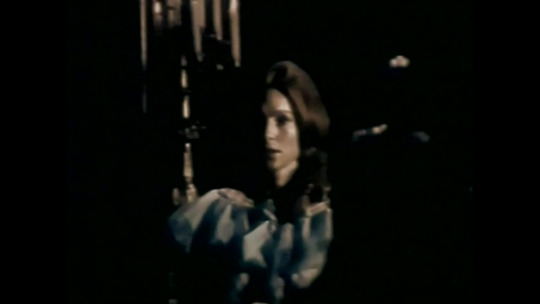
youtube
House of the Living Dead (1974)
My rating: 3/10
#House of the Living Dead#Ray Austin#Marc Marais#John Brason#Mark Burns#Shirley Anne Field#David Oxley#Youtube
1 note
·
View note
Text


This 1861 home in New Orleans, LA has been renovated into a triplex. However, the listing says that it can also be a single family. It has a total of 6bds, 4bds, 2,680 sq ft, $765k.

It's quite a sunny home. They made this a living/dining room combo with the original fireplace.

A wide opening is almost open concept to the kitchen.


I like the kitchen remodel, especially the details on the island and the original fireplace. It's clever how they floated a table and a sideboard on the wall next to the fireplace. I like the way that looks.

The bedrooms are typically not very large, but this one is nice and has good natural light.

They've got a Murphy bed in this room.

There's a lovely bath off this bedroom. It has nice beadboard wainscoting, a vintage tub and a pretty double sink.

Bedroom #3 is a child's room.

The laundry also has a shower and a cute little sink.

The 2nd unit is on the upper floor. It has a very light kitchen/living room combo and a door to a terrace.

The kitchen is very nice, but could use a backsplash and some sort of exhaust.

Look at the beams across the open ceiling in the primary bedroom. Love the original fireplace.

The 2nd bd. is small and appears to be a nursery.



The layout is a little awkward up here, but I'd call it "creative." It doesn't look bad, but I would've tried to configure it differently. I don't like not having any option but a rain shower, though.


There's a small courtyard in the back, plus a very nice, separate guest house. The lot is 3,000 sq ft, so there's not much land, but the guest house has a big porch.


This is lovely, isn't it? Has an original, but non-working, fireplace. I feel like they could've made the kitchen a little smaller to give the living room area more space.

It has a laundry room, which is always a plus.

A 3pc. bath.


And, there's a nice roomy bd. on the 2nd level.


https://www.zillow.com/homedetails/1501-Marais-St-New-Orleans-LA-70116/148977647_zpid/?
126 notes
·
View notes
Text
PLAYING FOR KEEPS ────── iamquaintrelle (✨💕)


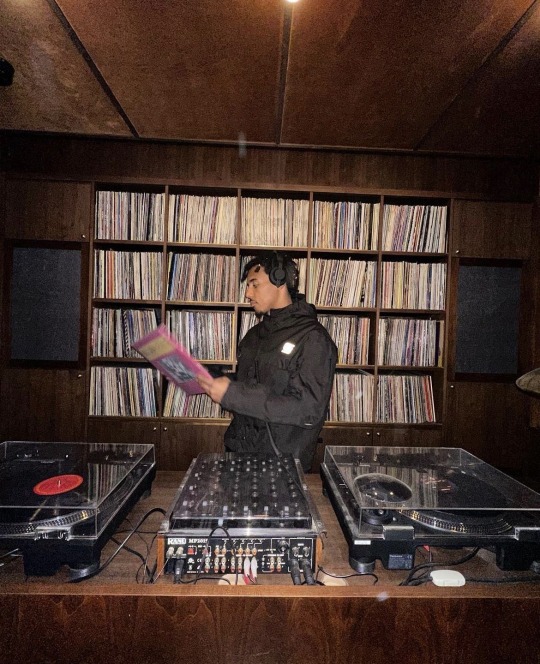
⌗ pairing : jules koundé x black oc
⌗ tags : @irishmanwhore @lettersofgold @deonn-jaelle @sucredreamer @greedyjudge2 @f1-football-fiend @2serenity0 @peyiswriting @coffeevacation
⌗ summary : jules is focused on himself — no girlfriend, no drama — but now he seems to have both after pictures of him having fun at a friend's house party shows up in tabloids, and now fashion houses are calling for him? and his agent wants him to keep up this charade? ♡ masterlist.
Jules was all about the grind lately. Training, press, brand meetings, repeat. No time for relationship drama or late nights that didn't involve reviewing game footage. His DMs were constantly filled with heart emojis and "my friend thinks ur cute" messages that he left on read. The tabloids called him cold, but he called it focused.
That's why he was surprised to find himself at Antoine's 90s/00s-themed house party in Le Marais after a crazy few days of attending Fashion Week shows. The apartment was a vibe — exposed brick and big windows with vintage MTV music videos projected on one wall. Someone had hung those metallic dangly curtains everywhere, and the whole place was tinted in purple and blue LED lights that made everyone look like they were in an old-school music video.
The crowd was a mix of football players, fashion week leftovers, and local party regulars. Girls in low-rise jeans and crop tops were everywhere, and more than a few guys had committed to FUBU jerseys and backward caps. Jules had kept it simple - white tank, vintage Prada sport pants, and a gold chain.
"Get Low" started blasting through the speakers and suddenly everyone was dropping it like it was 2003. Jules nursed his drink by the window, watching the chaos. The bass was so heavy he could feel it in his chest, mixing with the persistent buzz of his phone. Probably his agent wondering why he'd been tagged at a party instead of resting before tomorrow's training.
He was about to leave — this wasn't really his scene anymore — when he spotted her across the room. The girl who regularly roasted his outfit choices at Louis Vuitton, looking completely different outside the store. She was wearing what looked like a reconstructed Dapper Dan-inspired vintage LV monogram dress that definitely wasn't official merchandise, her hair up in two buns Princess Leia would envy. And she was absolutely destroying everyone in a dance battle to "The Whisper Song."
Jules couldn't help but smile. Who knew the girl who told him his €500 sweater made him look like a sad corporate mascot could move like that?
He didn't realize he was staring until she caught his eye mid-body roll and smirked. The same smirk she gave him last week before telling him his new Balenciaga sneakers looked like "orthopedic shoes for a cyberpunk grandpa."
Maybe he'd stay for one more song.
The dance battle ended with her throwing up peace signs and disappearing into the kitchen. Jules found himself following, weaving through a crowd of people that was tonguing each other down. The kitchen was quieter, if you could call anything quiet when Lil Jon was screaming "YEAH!" through the speakers next door.
She was perched on the counter, drinking water from a wine glass like it was champagne. Up close, he could see her dress was definitely handmade - a masterpiece of Louis Vuitton shopping bags.
"Your Air Force Ones are actually clean for once," she said instead of hello, looking him up and down. "Did you finally learn how to use a magic eraser, or did you just buy new ones?"
"Do you ever get tired of roasting people's outfits?" Jules leaned against the fridge, trying to look unbothered, but she always had a way to get under his skin.
"Do you ever get tired of giving me material to work with?" She grinned, taking another sip of water. "What's a football boy doing at a fashion week afterparty anyway? Shouldn't you be in bed watching game clips or whatever it is you do?"
"Shouldn't you be at Louis folding scarves or whatever it is you do?"
"Bold of you to assume I fold anything. I'm strictly there to judge people's choices and occasionally sell bags to WAGs who pretend not to know who you are."
The music changed to "Say My Name" and a chorus of drunk screaming erupted from the living room. Jules found himself laughing — actually laughing — for the first time in what felt like months.
"I'm Mila, by the way," she said, extending her hand like a queen waiting for someone to kiss it. "In case you were wondering who's been destroying your fashion confidence for the past three months."
"Jules," he replied, even though they both knew she definitely knew who he was. "In case you were wondering who's been ignoring your styling advice for the past three months."
"Well, Jules, now that we're introduced, want to tell me why you keep coming into my store just to ignore my professional opinion?" She hopped off the counter, landing gracefully despite her platform boots. "Because either you secretly love being told your taste is questionable, or you're really bad at shopping anywhere else."
He was saved from answering by a girl bursting into the kitchen, her Y2K butterfly top slightly askew. "Mila! Dom's about to play your song but he's also about to pass out so if you want to—"
"That messy bitch," Mila muttered, already heading for the door. She turned back to Jules. "Don't leave yet. I still need to tell you how that chain is giving wannabe 2003 Justin Timberlake."
Jules watched her disappear into the crowd, presumably to save her DJ friend from face-planting onto his equipment. The kitchen felt weirdly empty now, even as drunk partygoers stumbled in and out looking for mixers.
He should leave. He had early training tomorrow, and his teammate was definitely going to snitch to their coach about him being out late. But then Nelly's "Hot In Herre" started playing, and he could see Mila through the doorway, dramatically lip-syncing every word while trying to prop up a swaying DJ.
Maybe he'd stay until the end of this song too.
Three songs later, he was still there, watching Mila and her friends absolutely destroy the choreography to "Dilemma." She kept catching his eye and grinning, like they were sharing some private joke about everyone else at the party.
By the time two in the morning rolled around, the crowd had thinned out, the playlist had switched to slow R&B, and Jules found himself back in the kitchen with Mila, both of them picking at the sad remains of the snack table.
"I'm starving," she announced, examining a stale chip like it had personally offended her. "And not in a 'these sweaty pretzels will do' kind of way. In a 'I need real food immediately' way."
"There's a McDonald's around the corner," Jules heard himself say, even though he hadn't had McDonald's since his academy days. "If you want actual food."
Mila's eyes lit up. "McFlurry run? In this economy? In these outfits?" She grabbed her tiny matching shoulder bag. "Absolutely yes."
The McDonald's was exactly what you'd expect at two-thirty in Paris — a mix of drunk tourists, exhausted delivery drivers, and a few fashion week zombies still in full runway looks. Jules and Mila probably should've looked out of place, but somehow they fit right into the beautiful mess.
"If you tell anyone at Louis that I'm eating McDonald's in this dress, I'll have to kill you," Mila said, stealing one of his fries. They'd grabbed a corner table, their knees bumping underneath because the space was tiny. "I have a reputation to maintain."
"What, the reputation of being fashion's most brutal critic? Pretty sure that's safe." Jules pushed the fries between them to share properly. "Yesterday you told a guy his Gucci loafers looked like something a divorced dad would wear to a casino."
"First of all, they did. Second of all—" She paused mid-fry theft, eyes narrowing at something over his shoulder. "Don't react, but there are definitely people taking pictures of us right now."
Jules started to turn but Mila kicked him under the table. "I said don't react! God, you're bad at this. Just act natural." She took a dramatic bite of her Big Mac. "Though I guess the tabloids catching you eating McDonald's is better than them catching you at that party."
"My agent's going to kill me," Jules groaned, but he couldn't bring himself to care that much. He was having too much fun watching Mila attempt to eat a burger while maintaining her cool fashion girl image.
"Please, this is probably good for you. Hot football player eating late night McDonald's with a mystery girl? Looking like a whole vibe in vintage Prada? The internet's going to eat this up." She dipped a fry in her McFlurry with zero shame. "No offense but you could use some spice in your public persona. You're getting a reputation for being boring."
"I'm not boring, I'm focused," he protested, but even he didn't fully believe it anymore. Not when he was sitting in McDonald's at almost three in the morning, watching one of Paris's most exclusive luxury store employees demolish fast food like it was her last meal.
"Sure, focused," Mila smirked. "That's why you keep coming into my store just to get roasted. Because you're so focused."
Before Jules could defend himself, Mila's phone buzzed. She glanced at it and nearly choked on her McFlurry.
"Oh my god," she turned the phone to show him. "We're already on Twitter."
The photo was actually good — like, annoyingly good. Someone had caught them mid-laugh, fries scattered between them. The harsh McDonald's lighting somehow glowed against the gold hardware of Mila's reconstructed dress and the vintage Prada track jacket Jules had thrown on before leaving the party. They looked like an editorial trying to be casual, except their laughter was too real.
"Look at the quotes," Mila scrolled, her platforms kicked up on his side of the booth now. "'Who is she?' 'The way they're matching without matching?' 'That LV reconstruction is everything!' At least they appreciate art." She gestured to her dress with a fry.
Jules leaned back, taking in the situation. He'd spent years cultivating his image - the serious athlete who just happened to have top-tier taste. The guy who could mix high fashion with streetwear so well that GQ had done a spread on his game day arrival fits. But he'd never looked this… effortless. Something about sitting across from Mila, who treated Balenciaga sneakers and McDonald's fries with the same level of critical analysis, made everything feel less curated.
"Your agent's definitely awake by now," Mila said, still scrolling. "The fashion girlies are going crazy trying to figure out who I am. Ooh, someone recognized me from Louis! Watch this turn into 'Football Star and LV Girl' by the afternoon."
His phone buzzed. Then buzzed again. And again.
"That's probably my team's PR group chat exploding," he groaned, but couldn't help smiling. "Think Louis Vuitton will fire you for eating McDonald's in a dress made from their shopping bags?"
"Are you kidding? This is the most interesting thing that's happened to their brand this week. Fashion week's been boring." She stole his phone, adding her number. "You're going to need my contact info when this blows up anyway. Can't have you telling reporters the wrong designer credits for my outfits."
The notification previews were already wild — his agent, his teammates, fashion blogs, sports accounts. But watching Mila save herself as "LV's Meanest Stylist 👑" while demolishing what was left of their fries, Jules found himself caring less about damage control and more about when he'd see her again.
Even if it meant getting roasted for his next outfit choice.

It wasn't as brutal as Jules expected. Well, physically at least - he'd stuck to Gatorade at the party and he snuck in a power nap on the plane ride back to Barcelona. But his phone? Complete disaster zone.
217 unread messages. 68 missed calls. His agent had sent a voice note that was just straight screaming. Even his mom texted, asking who "that girl with the beautiful dress" was.
Jules scrolled through his notifications while his coffee brewed, still in his designer silk pajamas (that Mila would probably roast him for if she knew about them). Twitter had done its thing with someone had already made a thread analyzing their "couple aesthetic" and how it was "shifting the paradigm of sports-fashion crossover." Whatever that meant.
His phone buzzed again. Mila.
LV's Meanest Stylist: your form for running away from paparazzi outside my store is terrible btw. someone just showed me old pics. we need to work on that along with your sweater choices 💅🏾
He caught himself grinning at his phone like an idiot. Before he could reply, another text came through:
LV's Meanest Stylist: also check vogue's instagram story. we're about to have an interesting day at work bestie 🥰
The Vogue story was… a lot. They'd picked up the McDonald's photo, paired it with his past fashion week appearances and what they could find of Mila's work fits. The caption was killing him: "Football's New Fashion Power Couple? Jules Kounde spotted with mysterious Louis Vuitton stylist - serving looks and McFlurries 👀"
His agent was calling. Again.
Jules finally picked up his agent Bruno's call, putting it on speaker while he got dressed for training.
"Have you seen what's happening? This is Cristiano and Georgina levels of potential. She was at Gucci, he was just shopping, now look at them!" Bruno was in full spiral mode. "And yours is even better - you're both already in fashion, both have the aesthetic, and that McDonald's photo? You couldn't plan this kind of organic viral moment."
Jules tugged on a vintage Helmut Lang sweater (that Mila had actually approved of last time, even if she said it made him look like "an art curator having a midlife crisis, but in a hot way"). He thought about how he'd started finding excuses to visit Galeries Lafayette whenever he was in Paris, always timing it when he knew she'd be working. How she'd clock him the moment he walked in, already preparing her roast for whatever he was wearing.
"Bruno, it's not like that—" he started, but his agent was on a roll.
"The internet loves her already. She's got that whole 'devil in Prada' thing going but make it Gen Z. Plus she works at Louis! Do you know how perfect this is for your image? You're already getting more luxury house follows—"
Jules thought about Mila's unfiltered commentary on everything - not just clothes. How she'd rate people's outfits out loud in public like she was doing director's commentary. Everyone assumed it was an American thing, that typical no-filter attitude, but Mila took it to an art form. She'd call out fashion week scammers and hypebeasts with the same energy she used to debate whether Jules' latest Bottega purchase made him look like "money or new money."
"—are you even listening? This could change everything. The serious athlete image was working but this? This is—"
"Bruno," Jules interrupted, "I actually need to get to training. Can we talk strategy later?"
After hanging up, he stared at Mila's last text. She'd sent a photo of the crowd outside Galeries Lafayette:
LV's Meanest Stylist: these vultures really think i'm gonna serve them looks at 8am? bestie we need to coordinate our chaos because your fans are UNHINGED
He smiled, typing back: wear something worth getting photographed in, LV's meanest stylist 👑
Her response was instant: bold words from someone who owned those tragic Balenciaga crocs
His Urus purred through Barcelona traffic, Kendrick's "N95" drowning out his thoughts about the chaos waiting at training. The teasing was going to be relentless - his teammates lived for any crack in his usually composed life, yet his mind kept drifting back to Mila instead of dreading the locker room jokes.
Jules parked at the training facility, but didn't get out immediately. Against his better judgment, he pulled up Twitter.
"Fuck…" he muttered, running a hand through his locs when he saw he was still trending. The newest viral photo wasn't even from McDonald's - someone had snapped Mila at work in Galeries Lafayette, probably from earlier this morning.
She looked exactly like herself - unbothered and effortlessly cool in a blazer from Pharrell's men's line, paired with cigarette pants and what looked like an LV open-back crop top. Her brown skin glowed under the store lighting, her straight dark hair falling perfectly with curls at the ends, even as she seemed to be mid-roast of whatever poor soul was in front of her.
The comments were wild: "THE MATERIAL GIRL AND FOOTBALL BOY WE DESERVE 😭" "nah her style is actually insane?? that blazer with those pants??" "when is she coming to watch him play in barcelona tho 👀" "they literally match without trying, your fave couples could never" "LV girl has more sauce than half these football wives I'm crying"
Jules caught himself smiling at his phone. The internet was doing that thing where it turned real people into characters, spinning narratives from two photos. But they weren't completely wrong about Mila's style - she didn't just talk the talk. Even in the leaked store photo, she looked like she'd walked off a runway but make it corporate chaos.
His phone buzzed with another text from her: "your fans found my old fashion blog. it's giving parasocial relationship but make it haute couture"
The Barcelona training ground was already buzzing when Jules walked in. He'd tried to time it perfectly - not too early, not too late - but it didn't matter. He could feel the eyes on him before the comments even started, everyone had definitely seen the photos. His attempt to slip quietly into the locker room failed spectacularly when Marc, their goalkeeper, slow clapped his entrance.
"Damas y caballeros, nuestro propio personaje principal ha llegado (Ladies and gentlemen, our own main character has arrived)," Marc announced, grinning like he'd been waiting all morning for this moment. "El hombre que rompió Fashion Twitter con McDonald’s. El rey de las colaboraciones inesperadas. El..." (The man who broke Fashion Twitter with McDonald's. The king of unexpected collabs. The—)
"Cállate," Jules threw his bag at Marc, but he was fighting a smile.
"No sabía que lo tenías en ti (Didn't know you had it in you)," Pedri chimed in, not looking up from his phone where he was definitely scrolling through the trending topics. "Todo este tiempo actuando demasiado centrado en el drama, luego te vuelves viral con la reina de la mala de Louis Vuitton." (All this time acting too focused for drama, then you go viral with Louis Vuitton's queen of mean)
Jules started unpacking his bag, trying to maintain his usual unbothered expression. The kit designers had actually consulted him on this season's away colors - not that he'd tell his teammates that. They already thought he was too into fashion. "Todos ustedes necesitan mejores pasatiempos."
"¿Mejor que verte tendencia en todo el mundo? Nunca." Marc was scrolling through his phone now, perched on the bench like he was about to give a presentation. "Dios mío, ya hay cuentas de fans dedicadas a ti: ‘Jules and Mila Fashion Archive’ ya tiene 5 mil seguidores. Espera hasta que descubran que realmente vas a su tienda solo para que te asen—"
"¿Cuánto tiempo has estado tramando esto?" Pedri interrupted, finally looking up. "Porque mi chica sigue su blog de moda y aparentemente has estado en el fondo de las fotos de su tienda durante meses."
Jules paused midway through lacing up his boots. He hadn't known about any store pictures. The thought of him showing up in the background of Mila's content while she probably roasted his outfits to her followers was… actually exactly her style.
"Recuerda cuando firmó por primera vez y usó esos crocs de diseñador para entrenar?" Marc was on a roll now. "Apuesto a que ella tendría un día de campo con esas fotos—"
"Esas eran ediciones limitadas," Jules defended.
His phone buzzed in his locker. Speaking of the devil: your team's social media manager just followed me. should i be worried or flattered?
"Ooh, está sonriendo a su teléfono!" Lamine, one of the younger players, called out. "¡Julio en realidad está emocionando! ¡Rápido, que alguien tome una foto antes de que vuelva a su cara de modelo en reposo!" (Ooh, he's smiling at his phone. Jules is actually emoting! Quick, someone take a picture before he goes back to his resting model face!)
"¿Qué está diciendo?" Marc tried to peek at his phone. "¿Está asando tus opciones de atuendo a larga distancia? Porque esos pantalones de chándal que usaste la semana pasada..."
"Focus up!" Flick's voice cut through the locker room. "Save the gossip for after training. Jules, we'll be discussing social media strategy with PR later. Apparently, you're bringing in a new demographic we need to 'strategically leverage' or whatever they're calling it."
Jules grabbed his water bottle, already dreading the PR meeting. He could just imagine the PowerPoint presentation they'd prepared. As if his relationship with Mila - whatever it was - could be turned into a marketing strategy.
Another text came through as they headed out to the pitch:
LV's Meanest Stylist: some fashion blog found pics of you actually wearing the pieces i suggested. they're calling it a 'slow burn fashion romance' i'm screaming 💀 there's a whole timeline of your store visits matched with your match day fits. these people are UNHINGED. anyway good luck at training bestie, try not to get distracted thinking about my incredible style 😘"
"Julio!" Marc waved a hand in front of his face. "Deja de enviar mensajes de texto a tu gurú de la moda y concéntrate. A menos que quieras que el entrenador te haga hacer sprints adicionales."
He was definitely going to get megged at training for not focusing. His mind kept drifting to Mila's text about his match day fits - had she really been paying that much attention? The tabloids were about to lose their minds when they figured out he'd been lowkey getting styled by her through carefully timed "roasts" for months.
"Jules! Less smiling, more running!" Flick yelled.
Worth it though.

Mila's apartment looked like a crime scene of designer pieces she'd tried on and discarded. Her phone had been blowing up since that McDonald's photo dropped - fashion blogs, sports pages, and now Jules' agent calling for the fifth time.
She scrolled through her messages while heating up leftovers, pausing on one from her boss: "The engagement on our posts is up 200% today. Whatever this is, keep it professional." As if she hadn't kept it professional these past few months, roasting Jules' questionable fashion choices within the walls of Galeries Lafayette.
He'd shown up last fall during her shift, and when she'd told him his designer sweater was giving "tech startup CEO at a midlife crisis festival," he'd actually laughed. Started coming in several times a month, sometimes just to debate the merits of vintage versus new season pieces while she restocked displays.
Her phone lit up. Jules' agent again.
"Might as well," she muttered, picking up. "Hello?"
"Mila! Finally! Let's talk about this organic marketing goldmine you two have created—"
She moved the phone away from her ear, letting the agent ramble about engagement metrics and brand synergy. Her DMs were flooded with fashion houses wanting to "collaborate." Three months ago, they wouldn't even respond to her portfolio.
Her work phone buzzed with a store notification. Someone had requested her specifically for a styling appointment. Probably another footballer looking to recreate whatever was happening with her and Jules.
Mila put her phone on speaker, letting the agent's voice fill her kitchen while she made tea. He was going on about metrics and demographics, something about Jules' engagement being up 300% since the McDonald's photo.
"—and the fashion houses are loving this organic crossover moment. Your reconstructed piece was genius, by the way. Very editorial. Which is why we think—"
A text from Jules cut through the noise: "my PR team found your tweet about my 'tragic but endearing' yeezy phase. they're using it in the presentation. traitors."
Mila smiled despite the chaos. At least he was still giving her material to work with: "you wore those shoes to a MUSEUM opening. i was professionally obligated to drag you."
She hadn't meant to be at that party last night. Wasn't planning on going viral at McDonald's in a dress she'd reconstructed from LV shopping bags, yet here she was, accidentally becoming part of a narrative she hadn't signed up for.
Mila rolled her eyes, adding honey to her tea. She had three unfinished designs due next week and a client waiting on a custom piece. Whatever this was about could wait.
"—you two should continue dating. Or at least appear to be dating."
Her spoon clattered against the counter. "We should what now?"
"The optics are perfect!" The agent was on a roll. "The brutally honest stylist and the fashion-forward footballer? It's a narrative goldmine. Louis Vuitton's numbers are up, Jules' brand deals are through the roof, and you're already getting offers from—"
"We're not dating," Mila cut in, even though that was obvious. She'd just roasted his outfit choices for months and accidentally gone viral. That wasn't dating.
"Exactly! But imagine if you were. Or if people thought you were. The fashion week appearances, the match day fits, the social media moments..."
Her phone buzzed with a text from Jules: "my agent's crazy right? please tell me you're not actually listening to this facetime dating pitch"
"Listen," Mila pinched the bridge of her nose. "I style people. I critique awful fashion choices. I'm not about to play girlfriend for your marketing strategy."
"But you're already styling Jules. Already critiquing his choices. Already going viral together. Why not make it official? Think of the opportunities. The connections. The—"
Mila looked at her tea, then at her phone, then at the pile of design work waiting for her. This was ridiculous. She had deadlines. Real work. Actual goals that didn't involve pretending to date a footballer with occasionally questionable taste in sneakers.
But...
Mila glanced at her reflection in a mirror, mentally calculating. Jules wasn't completely lost when it came to fashion - boy actually had some drip. And unlike half the footballers who came through her store, he had his natural teeth - not a veneer in sight. The fact that he was fine as hell was just a bonus to his actually decent taste level.
Plus, this job was starting to drain her. The endless hours at Galeries Lafayette, the entitled clients who thought money could buy style, the corporate bullshit of it all. Last week some wannabe influencer had thrown a fit over a bag that wasn't even in production yet.
She could use this. Use him.
"What's in it for me?" Mila interrupted the agent's monologue.
The typing bubble appeared from Jules: "did you just ask about benefits? mila please don't encourage him-"
But she was already running the numbers. Fashion houses were watching. Her reconstructed pieces were getting attention. And Jules... well, having a footballer with actual potential to not dress like a fashion disaster wouldn't be the worst thing for her portfolio.
"Access to special archives for your reconstruction pieces," the agent started, like he'd been waiting for her to ask. "Front row at fashion week - not just Paris, we're talking Milan, New York. Creative control over Jules' match day fits, which means direct lines to any fashion house you want. Plus, Vogue wants to do a feature on your work - the pieces you've been creating, your styling philosophy, all of it."
A text from Jules popped up: "he's offering you the archives?? even I can't get in there 👀"
"And?" Mila took a sip of her tea, playing it cool even though her mind was already racing with designs she could create with archive access.
"And your reconstructed pieces get official LV backing. No more 'unofficial' collections. They're interested in a limited capsule release - young, edgy, sustainable. Everything you've been pushing for."
She set down her cup. Hard.
Another text from Jules: "take the deal before he offers to throw in his firstborn child 💀"
"Timeline?" Mila asked, already thinking about the archive pieces she could remix, the connections she could build, the doors this could open. "And I maintain creative control? Over everything?"
"Six months minimum. And yes - you've already proven you know what you're doing with his image. The McDonald's photo's got more engagement than his last three brand deals combined."
She glanced at her mood board, covered in designs she couldn't legally produce. Yet.
"Fine. But I have conditions."
Twenty minutes and several non-negotiables later, Mila's phone lit up with Jules' incoming call. She barely said hello before he started.
"So you like me that much, huh? Agreeing to be my girlfriend and everything?" His voice was annoyingly smug.
"Please. I like archive access and creative control. You're just the pretty package deal." She flopped onto her couch, kicking off her slippers. "How are you feeling about all this anyway?"
His laugh was unfairly sexy through the phone. "You're not exactly bad to look at yourself. Could be worse ways to boost my image than having fashion's meanest critic on my arm."
Mila rolled her eyes but couldn't help smiling. "Careful, I can still roast your outfit choices to my followers."
"You'll have to do that in person. Come to Barcelona - we need to get our stories straight anyway."
"I'll see what I can do." She examined her nails, trying to sound casual even though her mind was already picking out outfits.
"Mhmm," he hummed, voice dropping lower. "Bonne nuit, chérie."
"Sweetheart? Really getting a head start on the pet names?"
"Gotta save face, right?" She could hear his grin. "Sweet dreams."
The call ended and Mila's face broke into a wide smile, staring at her ceiling.
Oh, this was going to be interesting.
.................tbd
#jules kounde#jules kounde x black reader#jules kounde x black oc#jules kounde x you#footballer x oc#footballer x reader#fc barça fic#fc barcelona fanfic#jules koundé fanfic#jules koundé fanfiction#quain’s masterlist#quainwritings
106 notes
·
View notes
Text
ok so I watched Vaati’s new video on Rykard, really liked it overall but I wanted to go into more detail about what I liked and what I disagreed with.
Gonna start with a list of the things I loved/found super interesting:
The way he laid out the evidence for Rykard’s inquisition having been on behalf of Leyndell was really really well laid out!!!
I laughed at the “FAMILEEE” soundbyte
His discussion about the origins of “hexes” was super cool
I had never heard of the cut item description linking the Serpent Arrows to Shaded Castle!
The idea that poison was involved in Rykard’s desecration of the Minor Erdtree… he didn’t mention this, but this idea could explain why there’s sickly greenish growths at its base?


(Gelmir Minor Erdtree vs. Consecrated Snowfield Minor Erdtree)
Talked about the idea that the Great Serpent grew because of the sacrifices it was fed, then was killed, then came back as a normal-sized snake, that Rykard fed himself to and then grew large due to once again devouring sacrifices
Pointed out that the snakes inside the Abductor Virgins look like metal!!! I thought I was crazy for thinking this
1.0 Daedicar mentioned ‼️
His overall characterization of Rykard and his motivations is really good. he gets it
Now here’s some arguments he made that I disagree with:

Early in the video, Vaati makes the argument that the blue-robed Officials originate from House Marais because the blue robes are a part of Maleigh Marais’s garb as head of the House, because Inquisitor Ghiza wears bandages, suggesting that he’s “sickly born” like the rest of the Marais family, and because the unnamed guy in the Volcano Manor portrait also wears a metal mask like Maleigh Marais. He argues that House Marais were assimilated into Erdtree society, and presumably that the Official’s blue robes were a precursor to the other robes associated with the nobility (the Ruler’s robe, the Upper Class attire, and the Consort’s robe).
There are several reasons why I disagree with this theory:
Masks aren’t unique to the Marais family: the Ruler’s set comes with a Ruler’s mask, said to be “customary dress among lords,” and Tanith also wears a mask with her Consort’s robe. I speculated that masks are simply part of the noble fashion alongside the particular style of robe.
I don’t think it makes a ton of sense for pompous noblemen to have adapted their style of dress from a robe associated with a family of executioners carrying out “the darkest duties of mankind”
The Volcano Manor portrait guy does not have bandages under his mask like Maleigh does.
Maleigh and Ghiza don't really look alike at all:


Also, a different explanation for Ghiza’s bandages could be that he’s a remnant of the 1.0 version of Daedicar, a torturer in Rykard’s inquisition: “he would test new methods of torture first upon himself."
Overall I think a better explanation for the Marais attire is that, since their ancestral duty was serving as executioners on behalf of the Erdtree's justice system, they simply incorporated the Official's attire (worn by magisterial officials carrying out "surveillance, executions, gruesome rituals") into the garb of the head of their house.
I absolutely think House Marais is connected to Volcano Manor though; I've suggested that as executioners they serve as a branch of the Erdtree justice system working in tandem with Rykard's inquisition.
2. Later in the video, Vaati makes the argument that the Abductor Virgins were made after Rykard snakeified himself. I personally think that they were made before the snakening, but I can see the evidence for the contrary and I definitely think it’s possible. However, Vaati later says that the Abductors were used to transport people to the Underground Inquisition Chamber to be interrogated, which contradicts his argument that they were made after Rykard’s snakening… if Rykard is now a serpent, no longer a Praetor, what use is there for interrogation? And who is doing the interrogating, if Tanith was the only human left loyal to Rykard, and his inquisitors have long abandoned him? If the Abductors were made after Rykard became the serpent, the victims are probably just being fed to him.
3. Towards the end of the video, Vaati says that the serpent displayed in the Temple of Eiglay is the flayed skin of the Great Serpent, and that might explain the Godskin’s presence there. But it’s not the flayed skin of a snake, it’s a snake shed:

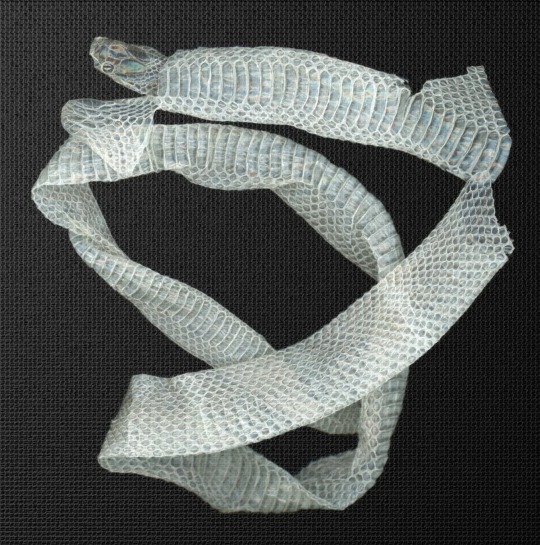
It’s a pale, milky, almost translucent color, with some ragged edges and holes. Snakes shed their skin as they grow, and we know the Great Serpent “devours, grows, and lives eternally.” Rykard even has some shed skin stuck to his body and tail:
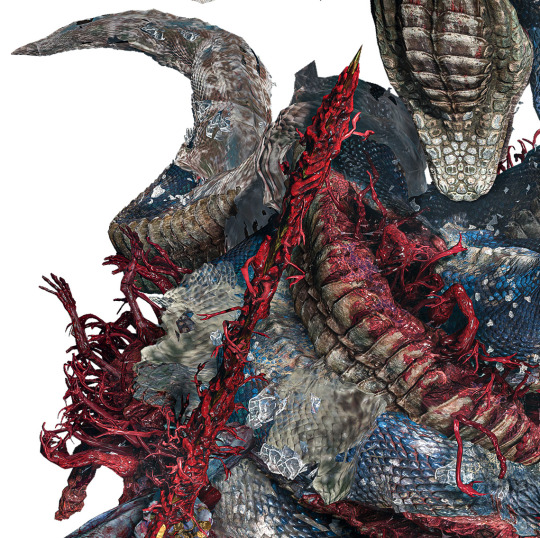
4. Lastly, I’ve beat this horse to death but you can’t say with 100% certainty that Rykard was born with red hair because he has pale hair in the present day. I will die on this hill
#elden ring#rykard#still a pretty good video and extremely watchable!!!#but when watching any lore video on youtube i think its important to not take things as gospel
202 notes
·
View notes
Text
Under the lights
word count : 2,914
warning ‼️ : smut
pairing : aurelien x black fem reader
summary : an evening out by yourself turns into a romantic, steamy night with your…..good friend.
note: lets just act like his house isn’t designed badly and it looks like how it’s described :) anyway, i hope you all enjoy and tell me what you think!!!
~~~~~~~~~~~~~~~~~~~~~~~~~~~~~~~~~~~~~~~~~~~~~
Paris was alive with its usual magic—glittering lights, cobblestone streets kissed by the faint glow of streetlamps, and the hum of evening conversations spilling out from the cafés. You stepped out of your favorite bistro in the Marais, the evening air cool against your skin. You adjusted your scarf, glancing up at the Eiffel Tower sparkling in the distance. The sight always managed to steal your breath, even after living in the city for two years.
“Y/n” a deep voice called behind you.
You turned, your pulse quickening as you recognized the tall, striking figure approaching you.
Aurélien Tchouameni.
The star midfielder for the French national team and an international sensation. His face—sharp jawline, piercing brown eyes, and an effortless charm—was a regular on billboards and magazine covers. But here, in the intimate glow of the Parisian night, he was just Aurelien. No flashing cameras, no roaring stadium crowds.
“ Aurélien,” you said, your voice steady despite the flutter in your chest. “What brings you here?”
“I was hoping to see you.”
His words were simple, but the intensity in his gaze made your cheeks warm. You met him months ago at a gala you’d been covering as a journalist. Since then, he had found ways to linger in your life—chance encounters that never felt entirely accidental.
“You were hoping to see me?” you repeated, an eyebrow arching.
He smiled, that slow, devastating grin that had charmed millions but seemed crafted just for you in this moment. “Does that surprise you?”
“A little,” you admitted, folding your arms as you leaned against the lamppost. “Big-time football stars don’t usually frequent neighborhood cafés.”
“Maybe I wanted to try something new,” he replied, stepping closer. The space between you shrank, and the cool air suddenly felt warmer. Your heart raced, but you masked it with a smirk. “And you thought you’d find excitement here?”
“I’m finding it now,” he said, his voice lower, softer. His gaze dipped briefly to your lips before returning to your eyes. “Let me take you out tonight.”
You hesitated. You weren’t immune to Aurélien’s charm, but you weren’t the type to swoon over fame or flashy gestures. Still, there was something about him—something genuine behind the confidence.
“Where?” you asked, tilting your head.
“You’ll see,” he said, offering his hand.
You stared at his outstretched palm, the smooth tone of his skin contrasting against the dark fabric of his coat. Finally, you took it, letting his warmth spread through you.
An hour later, You found yourself seated at a small, candlelit bistro tucked away in one of Paris’s quieter streets. The restaurant was intimate, with soft jazz playing in the background and couples scattered at tables, lost in their own worlds.
“How did you find this place?” you asked as you sipped your wine.
“A teammate told me about it,” Aurélien said, leaning back in his chair. “Said it was perfect for nights when you want to disappear.”
You raised an eyebrow. “Disappearing isn’t something I’d imagine you’d be good at.”
He chuckled, a sound that seemed to vibrate through you. “You’d be surprised. I’m not always looking for the spotlight.”
“And what are you looking for now?” you challenged, meeting his gaze head-on.
“You,” he said simply.
Your heart skipped a beat, but you forced herself to play it cool. “That’s a bold answer.”
“I’m a bold man,” he replied, his lips curving into a grin.
You couldn’t help but laugh, shaking your head. “Do you always say exactly what’s on your mind?”
“With you, yes.”
The sincerity in his voice caught you off guard. For a moment, you forgot where you were, lost in the way his eyes seemed to see right through your carefully constructed walls.
“Tell me about you,” he said, leaning forward. “The real Y/n. Not the journalist with the sharp wit or the woman who keeps dodging my calls.”
You smirked. “Dodging your calls? I prefer to think of it as… being selective.”
“Selective, huh?” He chuckled, his hand brushing yours on the table. The touch was brief but electric. “Then I feel even more honored to be here.”
“You should,” you teased, though your voice softened.
You talked for hours, the conversation flowing as effortlessly as the wine. You found herself opening up in ways you hadn’t expected—about your upbringing in New York, your move to Paris to pursue journalism, and the struggles of balancing ambition with vulnerability. Aurelien listened intently, his gaze never wavering.
“And you?” you asked, curiosity finally getting the better of you. “What’s it like being… you?”
He shrugged, a hint of vulnerability flashing across his face. “It’s not as glamorous as people think. The pressure, the scrutiny—it can get overwhelming.”
“But you love it,” you said, studying him.
“I do,” he admitted. “But it’s nights like this that remind me why it’s worth it. Meeting people who see me for more than just the headlines.”
Your chest tightened at his words. You’d spent so much of your career dissecting public figures, analyzing their every move. Yet here, sitting across from Aurélien, he felt disarmingly real.
By the time you left the bistro, the city had quieted. You strolled down the cobblestone streets, your footsteps echoing in the stillness.
“Thank you for tonight,” You said, glancing up at him.
“I should be thanking you,” he replied, his hand brushing yours as you walked.
The silence between you was comfortable, the kind that didn’t need to be filled. When you reached a small park near his apartment, Aurélien stopped, turning to face you fully.
“Can I ask you something?” he said, his voice low.
“Depends on the question,” you replied, your lips curving into a smile.
He stepped closer, the space between them evaporating. “Do you want to come inside?”
Your breath hitched. The way he looked at you—like you were the only thing that mattered in the world—made it impossible to say no.
“Yes,” you said softly.
The smile that spread across his face was radiant, his eyes lighting up with a boyish charm that made her chest ache.
Without another word, he cupped your face in his hands, his touch warm against your chilled skin. His lips met yours, gentle at first, as if testing the waters. But when you responded, tilting your head to deepen the kiss, his intensity grew.
Your hands found their way to his chest, feeling the steady thrum of his heartbeat beneath his coat. He pulled you closer, one hand tangling in your curls, the other resting on your lower back.
When you finally broke apart, both breathless, he rested his forehead against yours.
As you took his hand, your lips still tingling from his kiss, you couldn’t help but smile. For once, you felt like the walls you built around yourself didn’t need to stay so high. Maybe, just maybe, you were ready to see where this could lead.
The soft hum of jazz filled the air as you stepped into Aurélien’s apartment.
You weren’t sure what you had expected when you agreed to come inside, but the cozy, understated elegance of his home surprised you. Warm lighting, minimalist decor, and a wall of bookshelves gave it a personality you hadn't anticipated.
"You live here?" you teased, setting your coat on the arm of the sofa.
"Disappointed?" he asked, stepping into the open kitchen.
"No," you admitted, walking toward him.
"I guess I expected something flashier. This is... nice."
He smiled as he poured two glasses of wine.
"I don't need flash at home. It's the one place where I can just be me."
As he handed you a glass, your fingers brushed, and that familiar spark ignited. You tried to focus on anything but the way his presence seemed to fill the room. You talked and laughed as easily as they had at the bistro, right now felt different. More intimate. By the time you moved to the couch, your nerves were buzzing. Aurélien sat close, your knees brushing, his scent— earthy and clean-pulling you in.
"You know," he said softly, "I've been thinking about you all week." Your heart skipped.
"Oh I’m sure you have" you say slightly joking
He leaned closer, his voice dropping." And now that you're here, I'm not sure how I'm supposed to let you leave."
You laughed, but the sound was shaky. "You’re a bold man."
"I am bold man." he murmured, in agreement, brushing a curl from your face,
The air thickened, charged with unspoken desire. His hand slid to your cheek, his thumb grazing your skin as he leaned in. When your lips met, the world seemed to tilt. His kiss was slow and deliberate, as if savoring every second. You melted against him, your hands finding his shoulders as he deepened the kiss. The soft hum of music faded, replaced by the sound of your breathing, the gentle rustle of fabric as his arms circled your waist. When he pulled back, his forehead rested against yours once more, his eyes searching yours for permission to go further.
"Y/n," he whispered, your name a question and a promise all at once.
Your fingers curled into the fabric of his shirt as you nodded, your breath hitching. "Yes."
He lifted you effortlessly, carrying you toward the bedroom. The space was just as warm and inviting as the rest of his apartment, the soft glow of a bedside lamp casting shadows on the walls. Aurélien set you down gently, his hands never leaving you as he kissed you again, slower this time. His lips traced a path down your neck, his touch reverent as he explored your skin. Your head tilted back, your fingers tangling in his hair as you let herself surrender to the moment.
Aurelien's strong hands wrapped around your waist, pulling you close. He whispered your name "Y/n” his French accent making it sound like a secret. You unbuttoned his shirt, revealing chiseled abs and broad shoulders.
Your fingers traced the defined muscles, feeling the power that made him a force on the soccer field. Aurélien’s hands explored your curves, marveling at the beautiful mix of your bronze skin tones. He unzipped your dress, letting it pool at your feet, leaving you in black lace.
The dim light caressed your curves, making you look like a dark goddess. He stepped back to admire you. His breath caught in his throat. You moved closer, pressing your body against his. His lips found yours- hungry, possessive.
His hands moved to your thighs, lifting you up effortlessly. You wrapped your legs around him as he stumbled forward onto a plush love seat near an open window. The night air was cool on your bare skin, contrasting with the heat generated between you.
Aurélien broke the kiss to trail kisses down your neck, his teeth grazing your collarbone. Your head fell back, exposing more of your throat to his hungry mouth. He gripped your hips tightly, grinding his hardness against your core. You whimpered, your nails digging into his shoulders.
"I need you," Aurélien growled, his voice rough with desire. Your response was to squeeze your legs tighter around him, trying to get closer. He reached between your bodies, fumbling with his belt before tearing open a condom with his teeth.
As he kicked off his pants, you wriggled out of your underwear, leaving you bare before him. Aurelien paused, taking in your form - the swell of your breasts, the flare of your hips, the softness of your thighs.
“Si beau" he murmured. He slowly lowered you down onto him - easily sliding into you due to how you’ve secretly wanted him badly all night- his hands splayed possessively on your hips. He kissed you softly, his thumb stroking your cheek as he guided himself inside you.
You inhaled sharply as he filled you, your back arching to take him deeper. He wrapped your legs around his waist, his large hands supporting your ass as he began to move. The chair creaked under your movements, the room filled with your heavy breaths and soft moans.
Aurelien's strong arms lifted you up and down on him, his hands roaming over your curves possessively. He broke the kiss to look down at where you joined, his eyes darkening as he watched himself enter you.
"Tellement parfait" he growled, his voice strained with desire. He pulled out almost completely before slamming back into you , the force of his hips making you bounce on his lap. Your nails dug into his shoulders as you clung to him, your head thrown back in ecstasy.
"Look at me chérie” he commanded, his voice deep and demanding. You opened your eyes, meeting his intense gaze. He slowed his pace, moving deliberately now, making each thrust count. His thumb found your clit, circling it gently in rhythm with his hips.
Your eyes rolled back as pleasure overwhelmed you. "Aurélien" you whimpered, your voice barely audible. He smiled, his heart swelling with love and desire. He picked up the pace again, his thumb pressing harder against your sensitive clit as he fucked you mercilessly on the lounge chair.
He wrapped his arms around you , pulling you flush against his chest. "Wrap your legs around me," he ordered, his voice strained. You locked your ankles at his back, allowing him to go even deeper. He grunted, his face a mask of concentration.
Aurélien stood up, still buried inside you, and carried you to the bed. He sat down, keeping your legs wrapped around his waist, and leaned back against the headboard. Your back arched as he sank deeper into you, the change in position hitting your g-spot perfectly.
"You like that?" Aurelien asked, smirking as you whimpered and clung to him. He wrapped his arms around your thighs, opening you up even wider as he pounded into you. The bed creaked loudly, keeping rhythm with your bodies slapping together.
Your nails dug into Aurelien's shoulders once again as you tried to pull him closer, needing more of him inside you. He hissed at the sharp pain, but it only seemed to fuel his desire.
"More?" he growled, thrusting harder. You nodded, unable to form words as pleasure coursed through you. He reached between the two of you, finding your sensitive clit and rubbing in time with his thrusts.
"Tell me you want it," he whispered harshly against your ear, his breath hot and ragged. "Tell me you want me to make you cum all over my dick." His fingers continued their maddening dance on your clit, pushing you closer to the edge.
"I want it," you choked out, your voice desperate. "I want you to make me cum so bad." Aurelien grinned, his eyes dark with lust. "That's what I like to hear" he said, his thrusts becoming even more brutal as he drove into your gushing pussy.
"Your pussy feels so good around me," he groaned, adjusting his angle to hit just the right spot, triggering waves of pleasure through you. You could feel your orgasm building, intense and inevitable. "Not yet," he commanded, slowing his pace slightly despite her desperate whimpers.
"I'm going to count to three," he said, his voice low and commanding. "And when I reach three, I want you to cum for me. Hard." He started moving again, his thrusts long and deep, each one pushing you closer to the edge. "One,"
... "Two..." His pace picked up, becoming more urgent as he felt your muscles clutching him tighter. "Three..." A surge of pleasure rushed through you as he hit that perfect spot, and with his command, you shattered completely, your body convulsing around him in a powerful orgasm.
grunts "That's it... cum all over this dick" he growled, his own pleasure building as he felt you pulsating around him. "Don't stop... ride through it" he commanded, continuing his punishing rhythm.
As you rode through your release, he wrapped his hand around your neck. "Look at me," he ordered, his voice rough with barely contained passion. He wanted to see your face as he continued to thrust into you, prolonging your pleasure.
Your eyes locked, he picked up his pace, slamming into you as he gazed into your dilated pupils. "You're going to cum again, and again, and again..." He punctuated each word with a hard thrust, his hands gripping your hips possessively.
Needless to say, it was a long night. Time seemed to blur as you came together, your movements tender yet passionate. Your touch was a mixture of strength and care, his attention to your every reaction making you feel seen in a way you never had before. When you both finally lay tangled in the sheets, your breaths mingling in the quiet, you traced lazy circles on his chest.
"I wasn't expecting this," you admitted, your voice soft.
"Neither was I," he replied, pressing a kiss to your forehead. "But I'm glad it happened."
You smiled, closing your eyes as you rested against him. For the first time in a long time, you felt at peace-wrapped in the warmth of something that felt like it could be real.
“Goodnight, Y/n” he murmured, pressing a kiss to your temple before closing his eyes.
“Goodnight, Aurélien” you whispered, slowly drifting off to sleep.
#aurelien tchouameni#aurelien tchouameni x reader#aurélien fic#aurelien x black reader#aurelien tchouameni smut#aurelien tchouameni fanfic#deonn writes ✍🏾
55 notes
·
View notes
Text
Señorita Nothingburger
🎶When you see her, say a prayer /And kiss your heart arse goodbye 🎶
Lauren 2.0. Wow: after The Paid Companion, The Wannabe. Unlike the first round of revelations, this time the output has been totally disappointing. Very few things and zero context, which I have to say I was totally expecting, because it didn't exactly fit the agenda being pushed by Marple (amen!). Lightning never strikes the same place twice, right? And then, we had The Follow - a very interesting foolish, yet telling move: but on this, a bit further down the road, mind you.
So, let's ask ourselves along with La Ciccone: '¿Quién es esa niña?' For once, his IG follow has been very explicit:

Leading whoever to this account...

Elix Wellness is offering a very specific range of treatments, of which the one for hangovers really got me interested:

And yeah, even if I have apparently been scooped out by Marple on this one (my bad for sitting on it for a day), shamelessly using my patented methods (that is a lame joke), Lauren 2.0's LinkedIn account is, for once, very clear:


Her contract as a Travel RN was over by August 2023, as pointed out across the street:

And then she decided to go independent and open her own company. So, by far not a hooker - decent education, even, at NYU.
Lo and behold, who had Ibuprofen in his hotel room, in May 2023, when they were spotted on that NY Soho terrace, having lunch (didn't we laugh? you bet we did, it was one of my first posts in this fandom!)? S, of course. Hangovers could use both ibuprofen and a good IV cleansing treatment ( see above - such a common offering in that particular town, soon to be out of fashion - but hey: if she believes it can bring money, not my problem).
But... dating her? Not a chance in hell. You see, just a cursory survey of her IG account between the moment her contract as a Travel Registered Nurse was over and the moment her company started to be active, reveals a very busy Mediterranean summer, hitting all the possible cliches:
Before ending that contract, even, some days in Paris with her real interest, (again) checking all the tourist/romantic tropes you can imagine, from dining at the Au pied de cochon restaurant to having a quick macaron bite in the Luxembourg Gardens...
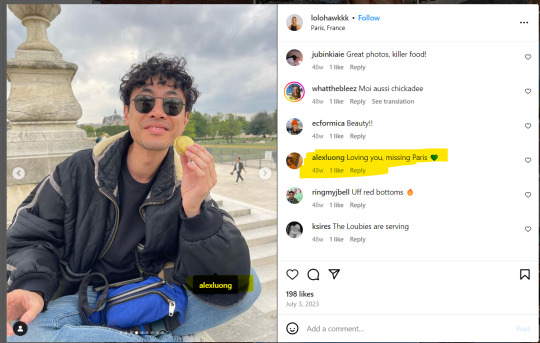
... then off to Paros, a posh island Greek destination, very much in vogue with the creative crowd, followed by (we are talking mandatory island hopping, here) Mykonos (unapologetically posh and very expensive, LGBTQ+ friendly destination - also beloved by the glam and glitz crowd)

Oh, hello Soho Roc House, part of the Soho Houses network - rings a bell? What a small world, really.

... a couple of days in Rome, followed by some quality family time (Mom and Pop, at a minimum) in Puglia, then Croatia (again, the glam crowd of Hvar island), back to Paris for a girls' trip (Montmartre, the Eiffel Tower and a couple other spots in the Marais and around the Rue de Rivoli - cliche forever):

... then back in Rome for cacio e pepe pasta, Piazza Navona and the Pantheon oculus (artsy girl, told you), followed by Positano and Capri (with Mom and Dad, again). Nothing to write home about, but still trying to sell herself as an up and coming influencer of sorts, perhaps.
Nowhere near S for the entire 2023 Sassenach Summer Tour. How is this equating with dating, that is really beyond me. Seriously. For instance, just before the second sighting, in NYC (June 10, 2023), she was having fun in the Algarve region and Lisbon (of course, Portugal). Probably posted those pics upon her return to NYC:

Dating? More like convenient pretext. He knew people would hang around that hotel (fans, autograph hunters, etc), especially during OL promo peak time. And he knew someone will take that pic, which was then conveniently placed in *urv's lap, for lengthy talks and more innuendo. Just as the first sighting was conveniently placed in Marple's inbox, to see if topic garners interest and sticks around/can be reused for further shits and giggles. Innuendo and nothing more would be my best bet: neither *urv, nor Marple had ANY positive idea about who she was, back at the time.
And now, the third drop was again placed in Marple's inbox, because attention had to be redirected to this particular gossip topic, in rather dire circumstances following Lauren 1.0.
And for your information, she does not follow S and he does not follow her. But he follows her newly opened joint: hangovers are a bitch, I know.
Why? I think it is clear enough why.
Who dunnit? I will let you draw your own conclusions, really. Again, it is rather plain to see. My belief is that this is not TPTB. And for once, I do not think he met her via Raya. Nope.
I took one for the team and listened to that podcast (if you are very foolish or brave or foolishly brave, you can do the same here: https://youtu.be/vBmcnhe2kwg?si=rRu5YCLHS3eZhuFs ). I mean, what is WRONG with those women? That is legit 14 year old bullshit talk about relationships (or the immature impossibility to have a satisfying one). They essentially explain in that podcast they have trouble decoding 'the man' in some relationships and the way they play out. I was laughing so violently my abs (or lack of them) hurt. At some point, I even thought it was some sort of sophisticated second degree, but NO (#cringe).
Also, I think I should be burning my pineapple pajama summer pants. Seriously. If you listen to the whole bullshit, you'll see there is no damn way to substantiate anything based on that. Zero connection.

95 notes
·
View notes
Text

WIP house marais progress
7 notes
·
View notes
Text
Where I think Miquella’s Followers were from and what their lives were like Pre-Shattering; A Short List
(Disclaimer that this is purely for fun and comprised of headcanons. I do not claim anything below as irl lore.)
Needle-Knight Leda; An orphan, probably from around Leyndell or somewhere on the Altus Plateau. Her life was misfortuned long before she met Miquella and swore herself to knighthood, so she has an unhealthy attachment to her "lord".
Redmane Freyja; A Redmane obviously, but I think her family likely originated from Limgrave. She started her career as a warrior/duelist long before she joined Radahn's army and rose through the ranks quickly due to her experience and prowess.
The Hornsent; We learn about his life a little in the dlc, but I hc him as a very different person pre-Marika and his family's death. A religious man and a homemaker, its no wonder he went insane with grief and hatred. I imagine he was absolutely WHIPPED for his wife and was the sort of dad who lets his kid put him in ridiculous outfits because it makes them happy.
Sir Ansbach; You're TRIPPING if you think this man wasn't a member of Leyndell's high society prior to meeting Mohg. The grace, the class, the educated mentality. This man was likely a noble or wealthy educator of some kind, and I hc that he was the organizer behind most of Mohg's ambitions & early cult years. He taught Mohg to be a leader of class and wit, and Mohg taught him to embrace his bloodlust. In my mind, they were together from the beginning and now Ansbach is alone.
Thiollier; There is a somewhat popular theory that this weak kitten boi is a surviving member of the Shaded Castle. AKA the noble House Marais. And you know what? They're right. Not only is he french-coded, this youthful tarnished was almost certainly wrote to reflect the emotional outcome of child neglect/abuse. Before meeting Saint Trina, it's clear he had little to live for. Like Leda, I hc that his childhood plays a large part in his obsessive personality towards a "savior" figure.
Sir Moore; This sweet pest obviously grew up in the Land of Shadow. I hc that he was in fact born a member of the forager brood & spent his young years exploring old ruins and unearthing unique "treasures" of the Hornsent v. Messmer war. Later, he learned incantations through the Rot to transform himself into a more human appearance and was likely the first to join Leda and Dane when they followed Miquella through the veil. He was always a valued member of the group, and I imagine Leda and Dane were too soft on him to consider killing him in timeline where the Tarnished convinces him to stay out of the final battle.
Dryleaf Dane; A reserved man, he was likely born to somewhere on the Altus Plateau and became a missionary for the Golden Order. He left the Lands Between long ago to spread the word of Marika, and likely went so far West he was in the East once more. I hc that he spent over a decade in the Land of Reeds learning martial arts, and likely only returned to the Lands Between Post-Shattering. Dane gives big "white man goes to Japan to learn how to be a Samurai" energy, the kind from those old movies your dad loves (you know the ones)
#elden ring#elden ring headcanons#shadow of the erdtree#er sote#elden ring dlc#needle knight leda#redmane freyja#sir ansbach#thiollier#moore elden ring#dryleaf dane#character rant#fanfic idea
49 notes
·
View notes
Text
Frev friendships — the Robespierres and the Duplays

(Shout-out to @sieclesetcieux whose thesis on Élisabeth Duplay Lebas is the origin of the majority of the primary sources gathered here.)
People will be curious to know how my brother Maximilien met the Duplay family. The day when the red flag was deployed and martial law proclaimed on the Champ-de-Mars by Lafayette and Bailly, my brother, who had seen the fusillades ordered by the hero of two worlds, and who returned, heartbroken with all these scenes of horror, following the rue Saint-Honoré. A considerable crowd pressed about him; he had been recognized, and the people cried vive Robespierre! M. Duplay, cabinet-maker, left his house, came before my brother, and engaged him to come into his house to rest. Maximilien accepted his invitation. After an hour or two he wanted to return home, but he was kept for dinner, and not even that evening did they want to let him leave; he slept in M. Duplay’s house, and remained there for several days. Madame Duplay and her daughters showed him the liveliest interest, surrounded him with a thousand delicate cares. He was extremely sensitive to all those sorts of things. My aunts and I had spoiled him by a crowd of those little attentions of which women alone are capable. All at once transported from the bosom of his family, where he was the object of the sweetest solicitudes, into his household on the rue Saintonge, where he was alone, let the change he had had to submit to be judged! The Duplay family’s provenances in his regard recalled to him those that we had had for him, and made him feel still more vividly the emptiness and solitude of the apartment he occupied in the Marais. M. Duplay proposed to him that he should come live with him, and be his host’s lodger. Maximilien, to whom this proposition was quite agreeable, and who anyway had never known how to refuse in fear of disobliging, accepted and came to live among the Duplay family. Mémoires de Charlotte Robespierre sur ses deux frères (1835) page 84-85
On the day of the massacre on the Champ-de-Mars, [Robespierre] came to the session at the Jacobins. The friends of liberty gathered there in very small numbers. The courtyard was soon filled with gunners and hunters from the barriers, blind instruments of the furies of Lafayette and his supporters. Robespierre was trembling with fear as he crossed this courtyard to return home after the session, and hearing these soldiers vomit imprecations and threats against the Jacobins, he was obliged, in order to support himself, to take the arm of Lecoitre [sic] of Versailles, in uniform of commander of the national guard of Versailles, and of Lapoype, since division general, then member of the club. He did not dare go to sleep on rue Saintonge au Marais, where he lived with Humbert. He asked Lecointe [sic] if he did not know any patriot in the vicinity of the Tuileries who could give him shelter for the night. Lecointe [sic] suggested Duplay’s house to him, and took him there. From that day on, he never exited. It is perhaps to this change of domicile that we must attribute the development of his ambition. As long as he remained with Humbert, he was accessible to his friends and patriots. Once at Duplay, he gradually became invisible. They sequestered him from society, they adored him, they entranced him, they destroyed him by exalting his pride. It should be noted that from his arrival in Paris until the time of Champ-de-Mars, he had been housed, fed, maintained, heated, served at Humbert's house. He never spoke to the latter about compensating him; he thought he was too honored to have had such a great man as himself as a companion. He never did him the slightest service, and during the last six months of her life, he had his door barred from him: the presence of a benefactor bothered him. Stanislas Fréron’s ”Notes on Robespierre,” published for the first time within volume 1 of Papiers inédits trouvés chez Robespierre, Saint-Just, Payan, etc., supprimés ou omis par Courtois; précédés du rapport de ce député à la Convention nationale (1828) but most likely dating back to right after thermidor.
My grandfather (Maurice Duplay) was not Robespierre’s compatriot; he was from Forez. It was not in Artois, where he never set foot, that he met Maximilien. Their reports had an equally honorable origin for both: they date from the day when martial law was proclaimed on the Champ-de-Mars. That day, the rumor having spread that the most influential members of the democratic party, and in particular Robespierre, were going to be arrested, my grandfather offered the latter, whose character and talent he admired, asylum at his home. His proposal was accepted, and, from then until his last moment, Maximilien did not cease to be the companion of my family. Undated letter from Philippe Lebas Jr. to Alphonse Lamartine. On August 9 1791, around three weeks after the massacre on Champ-de-Mars, Robespierre still gave his adress as ”n. 8 rue de Saintonge” when appearing as witness before the court of the 6th arrondissement. A month later, September 14 1791, the journalist François Suleau, who had gotten arrested shortly after the massacre, was asked who he wanted to represent him in court and answered ”M. Robespierre, residing on rue Saintonge,” whereupon he got the answer that Robespierre no longer lived there. Formally, Robespierre must therefore have moved to rue Saint-Honoré 398 somewhere between these two dates.
One evening, the carpenter brought back a stranger from the Jacobin club, whom he led by the hand into his apartment. It was a person of about thirty years old, dressed, according to the fashion of the time, in a waistcoat with a large lapel, a brown coat and silk breeches. “You are at home here,” he said to him as he entered: ”you shall be my son, and I shall be your father.” Then, showing him a group of young girls who were discreetly standing aside in a corner of the living room, he added: “My friend, here are your sisters.” He called his children with a gesture of authority: “Come here, Éléonore, Sophie, Victoire, Élisabeth; come, my children, come my daughters. I have brought you a brave citizen whom the counter-revolutionaries want to have arrested. This house will serve as his asylum. You already know him by name: it’s Maximilien [Robespierre].�� The young girls, who had read that name in the public papers and who had heard it often pronounced by their father with enthusiasm, surrounded the stranger. From that day on, the house had one more child. The carpenter, his wife, his daughters, everyone hurried to show a smiling face to him. He was asked to choose his own room: he designated one at the end of the courtyard under the roof, a simple and modest room which was lined, according to his tastes, with a hanging of blue damask with white flowers on it. [Maximilien's] habits were soon known; although not sumptuous in his attire, he was very clean: he liked white linen and put elegance into his clothes. Every morning, a hairdresser ran the detangler through her long, powdered hair. Having finished washing, he gathered with the carpenter's family for the morning meal. Maximilien had a sobriety worthy of the golden age: his breakfast consisted of bread and dairy products. Une Maison de la Rue Saint-Honoré by Alphonse Ésquiros, published in Revue de Paris, number 9 (May 1 1844). At the end of this article, Esquiros claimed to have obtained the information contained in it from Élisabeth Duplay Lebas herself. Shortly thereafter, said Élisabeth did however write a letter to the paper in order to ”protest loudly against the use that, without consulting me, you have made of my name, and to declare that this article, on many points in contradiction with my recollections, also contains a large number of inaccuracies.” She does unfortunately not indicate exactly which parts of the article are inaccurate and which ones are not, and certain details contained in it match up too well with what Élisabeth writes in her memoirs for me not to believe Esquiros hadn’t actually interviewed her prior to writing the article. In spite of her complaint, all the information in article was republished, almost entirely word for word, in volume 2 of Ésquiros’ Histoire des Montagnards (1847).
My dear friend, I arrived safely in Bapaume this Friday. The national guards of Paris, earlier camped out at Verberies, those of the department of Oise who had just arrived in the city the same day, joined by the patriots of Bapaume, presented me with a civic crown together with the testimonies of the most fraternal affection. The district and municipal directories, although aristocrats, did not disdain to come and visit my body. I was delighted by the patriotism of the National Guards, who seemed very well composed. Those of Paris found no preparation to receive them in Bapaume; those of Oise were forced to leave without weapons, and still do not have any. From Bapaume, several officers of the two corps, joined by a part of the national guard of Arras, who had come to meet me, took me back to Arras, where the people received me with demonstrations of an attachment that I cannot express, and which I cannot think of without emotion; a multitude of citizens came out of the city to meet me; to the civic crown that they offered me they added one for Petion; in their acclamations they often mingled with my name that of my comrade in arms and friend. I was surprised to see the houses of my enemies and of the aristocrats (who only appear here in ministerial or feuillantine form; the others have emigrated), illuminated as I passed, which I attributed only to their respect for the wish of the people. Eight days earlier one had made the same preparations because I was expected at that time. On both occasions, the municipality, which is of the order of the Feuillants, had spared nothing to oppose these steps taken by the people and the patriots: “If it were the king, it said ingeniously, we would not do the same; when we were installed, were we given honors? So no sooner had I entered my house when it sent out the alguazils of the police with the order to put out the lanterns, which was not always punctually carried out. The next day, another disorder broke out in the city: the national guards of Oise arrived in Arras through which they had to pass in order to get to their destination. They danced in the public square singing patriotic tunes and came to my house resounding with cheers that were extremely unpleasant for the ear of a feuillant. No other misfortune happened. The national guards stationed in this country are viewed very negatively by the ministerial aristocracy, which is very numerous; they spread to the surrounding villages to protect the inhabitants of the countryside against the dangerous insinuations of refractory priests who do incalculable harm; they revive languishing patriotism everywhere. I have no doubt that we will continue to do everything we can to disgust them and get rid of them. On our way we found inns full of emigrants. The innkeepers told us that they were astonished at the multitude of those they had been lodging for some time.
A miracle has just taken place here, which is not surprising, since it is due to the Gallvaire of Arras, who, as we know, has already done so many others: an unsworn priest said mass in the chapolle which contains the precious monument; truly devout people understood this. In the middle of the mass a man throws away two crutches that he had brought, stretches his legs, walks; shows the scar that remains on his leg, displays papers which prove that he had a serious injury; right after the miracle this man's wife arrives; she asks for her husband; is told that he walks without crutches; falls unconscious; regains her senses to thank heaven and cry out for a miracle. However, it was resolved, in the devout sauhedrin, that it would not be in the city that much noise would be made about this adventure, but that it would instead be spread throughout the countryside: since this moment several peasants have, in fact, come to burn small candles in the Calvary chapel. I still intend to not stay long in this holy land; I am not worthy of it. I shall however not leave it without regrets; because my fellow citizens have so far only given me the sweetest of pleasures: I will console myself by embracing you (vous). Please present the testimonies of my tender friendship to Madame Duplay, to your young ladies, and to my little friend. Also, please do not forget to remind me of La Coste and Couthon. Robespierre to Maurice Duplay, October 16 1791
Brother and friend, I received with gratitude the new mark of interest and friendship that you (vous) gave me in your last letter. I am seriously proposing, this time, to return to Paris in a few days. The pleasure of seeing you again will not be the least advantage I shall find there. I think with sweet satisfaction about the fact that my dear Pétion may have been appointed mayor of Paris as I write. I will feel more keenly than anyone the joy that this triumph of patriotism and frank probity over intrigue and tyranny must give to every citizen. Present the testimonies of my tender and unalterable attachment to your ladies, whom I very much desire to embrace, as well as our little patriot. Robespierre to Maurice Duplay, November 17 1791
My mother saw our attachment to Robespierre and his family with pleasure. For us, we loved him like a good brother! He was so good! He was our defender when my mother scolded us. That happened to me sometimes: I was quite young, a bit scatterbrained; he gave me such good advice that, as young as I was, I listened to it with pleasure. When I felt some unhappiness, I told him everything. He was not a severe judge: he was a friend, a good brother indeed; he was so virtuous! He venerated my father and mother. We all loved him tenderly. […] At that time (summer 1793) we often went walking as a family in the Champs-Élysées; ordinarily we chose the most retired paths. Robespierre often accompanied us in these walks. We passed happy moments together thus. We were always surrounded by poor little Savoyards, whose dancing it pleased Robespierre to watch; he gave them money: he was so good! For him it was a joy to do good: he was never happier than in those moments. He had a dog, named Brount, that he loved a lot; the poor animal was very attached to him. In the evening, after returning from the walk, Robespierre read us the works of Corneille, Voltaire, Rousseau; we listened to him as a family with great pleasure; he knew so well how to make what he was reading felt! After an hour or two of reading, he retired to his room, saying good evening to all. He had a profound respect for my father and mother; they too regarded him as a son, and we as a brother. Memoirs of Élisabeth Lebas Duplay, cited in Le conventionnel Le Bas: d'après des documents inédits et les mémoires de sa veuve (1901) by Stéfane-Pol, page 104 and 107-108
The days, the months, the years followed one another. Maximilien had become so well acquainted with this family that it had, in a way, become his own. He had another in Artois to whom he sent part of his salary as deputy, but he was nonetheless the adopted son of his hosts. The carpenter's four daughters loved him like a brother; they confided to him their sorrows, their feelings, their reveries. When one of those light clouds, which pass over the most united families, obscured the pure forehead of one of his young sisters, he gently drew her onto his knees and asked her in a low voice the secret of her sadness. If it was the trace of a discord or of some small domestic debates, he acted as conciliator between the offended parties. It was especially through him that Sophie, Élisabeth and Victoire had recourse after a falling out with their mother, to spare themselves the trouble of asking for pardon from their mother. Une Maison de la Rue Saint-Honoré by Alphonse Ésquiros, published in Revue de Paris, number 9 (May 1 1844).
[Maximilien] constantly went out in the middle of the day: where did he go? One didn't know. The carpenter told his daughters that Maximilien was going working for the public good; they had no idea in what way. […] Maximilien returned at six o'clock for supper. After leaving the table, he followed the carpenter and his daughters into the salon; these were charming family gatherings, full of grace and severity: the young girls, grouped in a circle around their mother, were working, with downcast eyes, on various needleworks. They separated at nine o'clock and said goodnight. On Thursdays only, these evenings took on a ceremonial character, a few guests, all friends of the house, gathered that day: it was David, the painter; Buonarotti, descendant of Michelangelo; Lebas, deputy; the brother of Maximilien, and some other close friends. Large mahogany armchairs covered in cherry velvet formed as they approached, a narrow but pleasant circle. They sometimes talked about literature: Maximilien read his favorite author, the tender Racine; as he said the verses well, he was asked to recite a few tirades from Bérénice or Audromanque; he carried it out with so much soul that he brought tears to all eyes. The carpenter's daughters, seated around their mother, listened to the reading while working; with modestly bowed eyelashes and feet on their stool, they contained their emotion within themselves. Then Buonarotti, who was a great musician, sat down at the piano: he was a dreamy and ardent soul, he played pathetic airs whose effect was inevitable: it seemed as if life was escaping beneath his fingers touching the quivering keys of the the instrument; they approached the windows to look at the sky, as this music lifted their hearts. However, the sky was full of stars, and hearts were full of love. One believed in family, in humanity, in the future. Seeing this interior so serious and so united, this sweet religion of the home, this cult of bare gray hair among old men and of modesty among young girls, one understood that the ancients had raised altars to the lare gods. These meetings did not last very far into the night: Maximilien retired at eleven o'clock to his room in order to work; often, until the whiteness of the morning, a little light could be seen shining in his window. Une Maison de la Rue Saint-Honoré by Alphonse Ésquiros, published in Revue de Paris, number 9 (May 1 1844).
Maximilien had brought back from a trip to Artois a large dog named Brount, whom he loved. This dog brought joy to the carpenter's daughters. He was another ally in the house. The animal, serious and thoughtful with its master, was playful with Victoire or Éléonore. Une Maison de la Rue Saint-Honoré by Alphonse Ésquiros, published in Revue de Paris, number 9 (May 1 1844).
Patriot Dupleix [sic], I learned indirectly that my brother is indisposed; I am worried; let me know about his situation as soon as possible. Send me also the cartridge that I asked my brother's friend to look for in his papers. Tell my brother that my sister is convalescing, and that I will send back Mme Witty's book in a few days. Don't waste a moment, send answers right away. My worry is at its peak. If neccesary I’ll come to Paris. Also send me some copies of the speech on the war that your friend gave and the observations of Pethion [sic] and Robespierre. I embrace you and your family. Augustin to Maurice Duplay, March 19 1792
In my second excursion to Paris, I experienced a surprise, which gave me anxiety for the future, and here you see the occasion. A rich carpenter by the name of Duplay, his wife, his three or four daughters and his son, a boy of fifteen or sixteen years old, all good people at heart, but very passionate and very narrow-minded, had become passionate about the Revolution. Towards the end of the Constituent Assembly, Duplay came in the name of patriotism to invite me to dinner and to spend the day in a house of his, on the Champ-Élysées, with my wife and children. I accepted, so as not to let them believe that I disdained their thoughtfulness, and also because our departure being very imminent, this connection could not last long. Among the guests were Pétion, Robespierre and Giraud de Pouzol, deputy of Puy-de-Dôme, a good and honest man, and a man of merit. The Duplay family was, moreover, all kinds of accommodating to our children. In this last trip of which I speak, I thought it necessary, therefore, to go and see them. I went there one morning. I was received very warmly, and ushered into the salon, to which was adjoined a small cabinet whose door remained open. What do I see when I enter? Robespierre, who had impatronized himself in the house, where he received homage such as those paid to a divinity. The small cabinet was particularly dedicated to him. His bust was enshrined there with various ornaments, verses, mottos, etc. The living room itself was furnished with small busts in red and gray terracotta, and lined with portraits of the great man, in pencil, blur, bistre, and watercolor. He himself, well combed and powdered, dressed in the cleanest dressing gown, was spread out in a large armchair, before a table laden with the finest fruits, fresh butter, pure milk and aromatic coffee. The whole family, father, mother and children, tried to guess in his eyes all his desires, in order to instantly please them. Mémoires de La Révellière-Lépeaux (1895), volume 1, page 114-115. The second meeting described took place somewhere in the summer of 1792, before the Insurrection of August 10.
The next day I (Barbaroux) was invited to another conference at Robespierre’s house. I was struck by the ornaments at his cabinet: it was a pretty boudoir where his image was repeated in all forms and by all the arts. His painted portrait was on the wall on the right, his engraved one on the left, his bust was at the back and his bas-relief opposite; there were also half a dozen small engravings of Robespierre on the tables. Mémoires inédits de Pétion, et Mémoires de Buzot et de Barbaroux (1866) page 358-359. This meeting took place shortly after the Insurrection of August 10 1792. Given the fact Barbaroux was executed in 1794 and his memoirs published 1866, 42 years after Révellière-Lépeaux’ death (his memoirs were in their turn published 1895) their claims that the Duplays had several busts and portraits of Robespierre were most likely independent from one another.
I should tell the whole truth. I have nothing but praise for the demoiselles Duplay; but I would not say the same for their mother, who did me much wrong; she looked constantly to put me in bad standing with my older brother and to monopolize him. Maximilien’s character took very will to Madame Duplay’s views; he let himself be led as she wished, and this man so energetic at the head of the government had no other will in his interior than that which was suggested to him, as it were. When I arrived from Arras, in 1792, I came to live with the Duplay family, and I saw at once the ascendancy they exercised on him; an ascendancy which was founded neither on wit, since Maximilien certainly had more of it than Madame Duplay, nor on great services rendered, since the family among whom my brother lived had not for some time been in a position to render them. But, I repeat, this ascendancy took its source, on one side, from my brother’s debonair attitude, if I may express it thus, and on the other from Madame Duplay’s incessant and often importune caresses. I resolved to take my brother out of her hands, and, to succeed at this, I looked to make him understand that, in his position, and occupying such a high rank in politics, he should have a home of his own. Maximilien recognized the fairness of my reasons, but long fought my proposition that he should separate from the Duplay family, fearing to distress them. In the end, I succeeded, not without effort, to make him take an apartment in the rue Saint-Florentin. Mémoires de Charlotte Robespierre… (1835) page 85-87
Robespierre only moved away from my father’s house a single time, in order to go live with his sister, whose imperious character rendered him really unhappy… Note written by Élisabeth Lebas, cited in Histoire de Robespierre (1867) by Ernest Hamel, volume 3, page 286.
Madame Duplay was very angry with me [for making Maximilien move away]; I believe she remained bitter towards me her entire life. We had lived thus alone for some time, my brother and I, when Maximilien fell ill. His indisposition was in no way dangerous. He needed much mare, and certainly, I did not let him lack for it; I did not quit him for an instant, I watched over him constantly. When he was better, Madame Duplay came to see him; she had not been informed of his indisposition, and made a great fuss because she had not been warned of it. She said some very disobliging things to me; she told me that my brother had not had all necessary care, that he would have been better cared for with her family, that he would lack for nothing; and that is what pressed Maximilien to return to her house; my brother at first refused weakly; she redoubled her insistences, I should say, her obsessions. Robespierre, despite my protests, decided finally to follow her. “They love me so,” he said to me, “they have such regard, such goodwill toward me, that it would be ingratitude on my part to repulse them.” This fact alone gives an idea of my brother Maximilien. He cedes to Madame Duplay, he resolves himself to leave his home, to become again a lodger in a foreign house, whale he has his house, his household, because he does not want to pain a person for whom he has friendship. I do not want to recriminate against him; far from me the thought of addressing reproaches to his memory; but in the end should he not have considered that his preference for Madame Duplay distressed me as much at least as his refusal could have afflicted this lady? Between Madame Duplay and me should he have hesitated? Should he have sacrificed me to her? After the disobliging words she had said, after having reproached me for having let my brother lack care, he who knew so well the contrary, should he not have reflected that leaving me to deliver himself to Madame Duplay’s care was to corroborate what she had said? And yet my brother loved me tenderly; his friendship for me was a thousand times stronger than that which he could have felt for a stranger; how then to explain the contradiction? Here it is: Maximilien was all devotion, he did not belong to himself, his life was a continual sacrifice, with great heart he hurt himself to please others; he did not hesitate thus, he who regarded me as a part of himself, to sacrifice me, as he sacrificed himself, so as not to affect a family who, by their caresses and kindnesses without number, had taken from him all methods of resistance. Mémoires de Charlotte Robespierre… (1835) page 87-89. We have no date for when Maximilien moved out, and then back in, with the Duplays. Hamel places it in September of 1793, when he claims Robespierre was ”slightly indisposed.” Mary Young, biographer of Augustin, places it in early 1793, in time for Rosalie Jullien to report about a dinner with the three siblings where Charlotte would have told her their domestic morals consisted of ”simplicity and candor.” In his memoirs (seen below), Maurice Gaillard claims Charlotte in May 1794 told him that ”when my younger brother passed through Melun (that is to say, December 1793) the three of us were living together.” Élisabeth’s memoirs imply Charlotte still lived with the family in April 1793.
I said before that I had much to complain about regarding Madame Duplay, and certainly, if I were to report everything she did to me I would fill a fat volume. When my brother, in fear of disobliging her, once again became once a lodger in her house, I went to see him quite assiduously. One cannot have any idea of the disgraceful manner in which she received me. I would have pardoned her dishonesties, her impertinences; but I what I will never pardon her is a word, a dreadful word, that she pronounced on my account. I often sent my brother jams or fruit comfits, which he liked a lot, or other sweets; Madame Duplay always let her bad humor show every time she saw my domestic arrive. One day when I had charged her with bringing a few jars of jam to my brother, Madame Duplay said angrily to her: “Bring that back, I don’t want her to poison Robespierre.” My domestic returned in tears to tell me of Madame Duplay’s dreadful blasphemy. I remained stupefied and could not speak. How to believe it? In place of going to ask an explanation, in place of going to complain to my brother of the horrible words she had said, the fear of causing him pain, and of provoking a scene which could only be very disagreeable restrained me, and I swallowed in sadness my grief and indignation. Mémoires de Charlotte Robespierre (1835) page 89-90
Robespierre the younger [was] nicknamed Bonbon, a repetition of his firstname Bon. Note written by the elderly Élisabeth Duplay Lebas, cited in Le conventionnel Le Bas : d'après des documents inédits et les mémoires de sa veuve (1901). An indicator Augustin was called by his nickname within the Duplay family.
[Robespierre’s] host's daughter passed for his wife and exercised a sort of empire over him. Causes secrètes de la révolution du 9 au 10 thermidor (1794) by Joachim Vilate, page 16
It has been rumored that this daughter [Éléonore] had been Robespierre's mistress. I think I can affirm she was his wife; according to the testimony of one of my colleagues, Saint-Just had been informed of this secret marriage, which he had attended. Mémoires d’un prêtre regicide (1829) by Simon-Edme Monnel, page 337-338
Madame Lebreton, a sweet and sensitive young woman, said, blushing: “Everyone assures that Eugénie [sic] Duplay was Robespierre’s mistress.” “Ah! My God! Is it possible that that good and generous creature should have so degraded herself?” I was aghast. “Listen,” cried Henriette, “don’t judge on appearances. The unhappy Eugénie was not the mistress, but the wife of the monster, whom her pure soul decorated with every virtue; they were united by a secret marriage of which Saint-Just was the witness.” Souvernirs de 1793 et 1794 par madame Clément, Née Hémery (1832) by Albertine Clément-Hémery
The eldest of the Duplay daughters, who Robespierre wanted to marry, was called Éléonore. Robespierre allowed himself to be cared for, but he was not in love. […] The Duplay family formed a kind of cult around Robespierre. It was claimed that this new Jupiter did not need to take the metamorphoses of the god of Olympus to become human with the eldest daughter of his host, called Éléonore. This is completely false. Like her entire family, this young girl was a fanatic of the god Robespierre, she was even more exalted because of her age. But Robespierre did not like women, he was absorbed in his political enlightenment; his abstract dreams, his metaphysical discourses, his guards, his personal security, all things incompatible with love, gave him no hold on this passion. He loved neither women nor money and cared no more about his private interests than if all the merchants had been free, obligatory suppliers to him, and the inn houses paid in advance for his use. And that’s what he acted like this with his hosts. Notes historiques sur la Convention nationale, le Directoire, l’Empire et l’exil des votants (1895) by Marc Antoine Baudot, page 41 and 242.
All the historians assert that [Robespierre] carried out an intrigue with the daughter of Duplay, but as the family physician and constant guest of that house I am in a position to deny this on oath. They were devoted to each other, and their marriage was arranged; but nothing of the kind alleged ever sullied their love. Testimony from Robespierre’s doctor Joseph Souberbielle, cited in Recollections of a Parisian (docteur Poumiès de La Siboutie) under six sovereigns, two revolutions, and a republic (1789-1863) (1911) page 26.
Madame Duplay had three [sic] daughters: one married the conventionnel Le Bas; another married, I believe, an ex-constituent; the third, Éléonore, who preferred to be called Cornélie, and who was the eldest, was, according to what people pleased themselves to say, on the point of marrying my brother Maximilien when 9 Thermidor came. There are in regard to Éléonore Duplay two opinions: one, that that she was the mistress of Robespierre the elder; the other that she was his fiancée. I believe that these opinions are equally false; but what is certain is that Madame Duplay would have strongly desired to have my brother Maximilien for a son-in-law, and that she forget neither caresses nor seductions to make him marry her daughter. Éléonore too was very ambitious to call herself the Citoyenne Robespierre, and she put into effect all that could touch Maximilien’s heart. But, overwhelmed with work and affairs as he was, entirely absorbed by his functions as a member of the Committee of Public Safety, could my older brother occupy himself with love and marriage? Was there a place in his heart for such futilities, when his heart was entirely filled with love for the patrie, when all his sentiments, all his thoughts were concentrated in a sole sentiment, in a sole thought, the happiness of the people; when, without cease fighting against the revolution’s enemies, without cease assailed by his personal enemies, his life was a perpetual combat? No, my older brother should not have, could not have amused himself to be a Celadon with Éléonore Duplay, and, I should add, such a role would not enter into his character. Besides, I can attest it, he told me twenty times that he felt nothing for Éléonore; her family’s obsessions, their importunities were more suited to make feel disgust for her than to make him love her. The Duplays could say what they wanted, but there is the exact truth. One can judge if he was disposed to unite himself to Madame Duplay’s eldest daughter by something I heard him say to Augustin: “You should marry Éléonore.” “My faith, no,” replied my younger brother. Mémoires de Charlotte Robespierre sur ses deux frères (1834) page 90-91.
We were five children: four daughters, Éléonore, Sophie, Victoire, Élisabeth; one brother named Maurice: he was the youngest of the family. My eldest sister was promised to Robespierre; my sister Sophie married M. Auzat, lawyer in Issoire, in Auvergne, under the Constituent; my sister Victoire never married. I married Philippe Le Bas. Note written by Élisabeth Duplay, cited on page 150 of Le conventionnel Le Bas : d'après des documents inédits et les mémoires de sa veuve (1901) by Stéfane-Pol.
Duplay's eldest daughter, Éléonore, shared her father's patriotic sentiments. She was one of those serious and just minds, one of those firm and upright characters, one of those generous and devoted hearts, the model of which must be sought in the good times of the ancient republics. Maximilien could not fail to pay homage to such virtues; a mutual esteem brought their two hearts together; they loved each other without ever having said so to each other, there is no doubt that if he had succeeded in bringing order and calm to the State, and if his existence had ceased to be so agitated, he would have become his friend's son-in-law. The slander, which spared none of those loved by the victim of the Thermidorians, did not fail to attack the woman he wanted to make his wife, and we were not afraid to write that a guilty bond united them. We, who knew Éléonore Duplay for nearly fifty years, we who know to what extent she carried the feeling of duty, to what extent she rose above the weaknesses and fragility of her sex, we strongly protest against such an odious imputation. Our testimony deserves all confidence. France: Dictionnaire Encyclopédique (1840-1845) by Philippe Lebas jr, volume 6, page 821.
A virile soul, said Robespierre of his friend [Éléonore], she would know how to die as she knows how to love... The destitution of her fortune and the uncertainty of the next day prevented him from uniting with her before the destiny of France was clarified; but he only aspired, he said, to the moment when, the Revolution finished and strengthened, he could withdraw from the fray, marry the one he loved and go live in Artois, on one of the farms that he kept from his family's property, to there confuse his obscure well-being in common happiness. (Extract from a part of l’Histoire des Girondins looked over by Philippe Le Bas). Le conventionnel Le Bas: d'après des documents inédits et les mémoires de sa veuve (1901) by Stéfane-Pol, page 78.
[Robespierre’s] relationship with Éléonore, the carpenter's eldest daughter, had a less protective and more tender character than with her other sisters. One day, Maximilien, in the presence of his hosts, took Éléonore's hand in his: it was, in accordance with the customs of his province, a sign of engagement. From that moment on he was seen more than ever as a member of the family. Une Maison de la Rue Saint-Honoré by Alphonse Ésquiros, published in Revue de Paris, number 9 (May 1 1844).
I have nothing but praise for Madame Duplay’s second [youngest] daughter, the one who married Lebas; she was not, like her mother and older sister, stirred up against me; many times she came to wipe away my tears, when Madame Duplay’s indignities made me cry. Her younger [sic, she means elder] sister was good like her. Both of them would have made me forget their mother and Éléonore’s lack of courtesy, if it had not been that these things once engraved in such an indelible manner in one’s heart, are not thereafter effaced. Mémoires de Charlotte Robespierre (1835), page 91-92
[Charlotte] occupied an apartment in the front, in my father’s house on the Rue Saint-Honoré. I was also good friends with her, and it was a pleasure to go see her often; sometimes I even pleased myself to help her with her hair and her toilette. She too seemed to have much affection for me. Memoirs of Élisabeth Duplay Lebas, cited in Le conventionnel Le Bas: d'après des documents inédits et les mémoires de sa veuve (1901) page 104. The friendship between Élisabeth and Charlotte is confirmed here.
Robespierre rarely dined outside of his house — six times at most during his stay on rue Saint-Honoré, said Buonarotti. Le conventionnel Le Bas: d'après des documents inédits et les mémoires de sa veuve (1901) by Stéfane-Pol, page 98. I was unable to discover the place where Buonarotti says this.
[Robespierre] rarely went out in the evening. Two or three times a year he took Madame Duplay and her daughters to the theater. It was always to the Théâtre-Français and to classical performances. He only liked tragic declamations which reminded him of the tribune, of tyranny, of the people, of great crimes, of great virtues; theatrical even in his dreams and in his relaxations. Histoire des Girondins (1847) by Alphonse de Lamartine, volume 4, page 132. Lamartine claimed to have interviewed Élisabeth Lebas Duplay (see below) and it therefore seems likely for this detail to come from her.
One day Camille familiarly enters the Duplay house; Robespierre was absent. He starts a conversation with the youngest of the carpenter's daughters; as he retires, Camille hands her a book he had under his arm. ”Elizabeth,” he said to her, ”do me the service of holding onto this work; I will come back for it.” No sooner had Desmoulins left than the young girl curiously half-opened the book entrusted to her custody: what was her confusion, seeing paintings of revolting obscenity pass under her fingers. She blushes: the book falls. All the rest of the day Elizabeth was silent and troubled; Maximilian noticed it; drawing her aside. "What's the matter with you," he asked her, "you look so worried to me?" The young girl lowered her head, and as an answer went to fetch the book with the odious engravings which had offended her sight. Maximilien opened the volume and turned pale. "Who gave you this?" he asked in a voice shaking with anger. The girl frankly told him what had happened. "It’s fine," Robespierre went on, "don't talk about what you've just told me to anyone: I'll make it my business. Don't be sad anymore. I'll let Camille know. It is not what enters involuntarily through the eyes that defiles chastity: it is the evil thoughts that one has in the heart.” He admonished his friend severely, and from that day on, visits from Camille Desmoulins became very rare. Histoire des Montagnards (1847) by Alphonse Esquiros, volume 2, page 417-418. In his Histoire de la Révolution Française (1858) volume 10, page 345, Louis Blanc, who claimed to have had the story told to him by Esquiros, who in his turn had obtained it from Élisabeth, writes that the book Élisabeth was given was l’Arétin. Given the fact that Élisabeth in a list written in her old days still places Desmoulins among the revolutionaries who frequented the Duplay house ”often,” I imagiene this incident happened in 1793.
It was the day when Marat was borne in triumph to the Assembly (April 24 1793) that I saw my beloved Philippe Le Bas for the first time. I found myself, that day, at the National Convention with Charlotte Robespierre. Le Bas came to greet her; he stayed with us for a long time and asked who I was. Charlotte told him that I was one of her elder brother’s host’s daughters. He asked her a few questions about my family; he asked Charlotte if we came to the Assembly often, and said that on a particular day there would be a rather interesting session. He urged her to come to it. Charlotte asked my good mother for permission to take me there with her. At that time, my mother liked her a lot; she still had nothing to complain of. My mother was so good that she never refused her anything that could please her. She allowed me to accompany her many times. Therefore, I was with her at the Convention. Memoirs of Élisabeth Duplay Lebas, cited in Le conventionnel Le Bas : d'après des documents inédits et les mémoires de sa veuve (1901) page 102-104.
At last, Charlotte came to get me to be present at a [Convention] session which was to be quite noisy. Le Bas came up to me; for the first time, he addressed me to tell me quite good things. He told Charlotte that there would be a night session, that it should be quite interesting, that she should ask permission for me to come with her. Charlotte had no difficulty obtaining it. She was Robespierre’s sister, and my mother regarded her as her daughter. Poor mother! She believed Charlotte as pure and sincere as her brothers. Great God! This was not so! We went therefore to that session. We had brought oranges and some sweets. Charlotte offered some to Le Bas and to her younger brother. These messieurs, after having stayed with us for some time, left us to go vote. I asked Charlotte if I could offer Le Bas an orange; she said yes. I was happy to be able to show him some attention. He accepted with pleasure. How good and respectful he seemed to me! As I said already, Mademoiselle Robespierre seemed pleased with me. At another session of the Assembly, where we once again found ourselves together, she took a ring from me that I had on my finger. Le Bas saw and asked her to let him see it, which she did. He looked at the figure that was engraved on it, and he was obliged, at that moment, to go away to give his vote, without having the time to return the ring, which caused me great torment; for he could not return it to me, and I no longer had it on my finger. Our good mother was dear to all of us and we trembled to cause her pain. At that same session, Le Bas had lent us, Charlotte and I, a lorgnette. He returned, for a moment, to speak to Mlle Robespierre of what had just happened in the session; I wanted to return his lorgnette to him; he did not want to take it back and said that we were going to have need of it again. He begged me keep it. He went away again, and, at that moment I pleaded with Charlotte to ask him for my ring back; she promised me to do so, but we didn’t see Le Bas again. He had charged Robespierre the Younger with making his excuses and telling us that he had found himself indisposed and had been obliged to leave, quite to his regret. And myself too, I regretted no longer having my ring and not being able to return his lorgnette to him. I feared to displease my mother and be scolded; this was a great torment to me. My mother was good, but very severe. Charlotte said, to console me: “If your mother asks you for your ring, I will tell her how it happened.” All this made me quite unhappy: it was the first time such a thing had happened to me. From that time, we did not have occasion to return to the Convention again. Charlotte told me to be calm about what tormented me so. She also told me that M. Le Bas was quite sick and could no longer return to the Assembly. I admit that this news made a great impression on me. I could not take account of it: I, so young and so gay, I became sad and pensive; everyone observed my sadness, even Robespierre, who asked me if I had some sorrow; I assured him that nothing was wrong, that my mother had not scolded me, that I could not take account of what I was feeling. He said kindly: “Little Élisabeth, think of me as your best friend, as a good brother; I’ll give you all the advice one needs at your age.” Later, he saw how much confidence I had in him. Memoirs of Élisabeth Lebas Duplay, cited in Le conventionnel Le Bas : d'après des documents inédits et les mémoires de sa veuve (1901) page 102-207
For some time, my health had been less good; my parents observed this and resolved to send me to stay a month in the country, with Mme Panis (in Chaville). She had all a mother’s cares for me; she took me walking in very beautiful gardens. One day, among others, she took me to Sèvres, to a country house inhabited by Danton. I had never seen him; but great God! How ugly he was! We found him with a lot of people, walking in a very beautiful garden. He came to us and asked Mme Panis who I was; she replied that I was one of Robespierre’s host’s daughters. He told her I appeared to be suffering, that I needed a good [boy]friend, that this would return me to health. He had the sort of repulsive features that frighten one. He came up to me, wanted to take my waist and kiss me. I repulsed him forcefully, though I was still quite weak. I was very young; but his face scared me so much that I pleaded insistently with Mme Panis not to bring me back to that house; I told her that this man had said horrible things to me, such as I had never heard. He had no respect for women, and still less for young people. […] I did not even want to stay in the country anymore; but my brother came to see me, and we passed a few more days there; and we departed once more for Paris. God! How happy I was to see my parents again! I had such a need to recount everything to my mother! The horrid mien of that man followed me everywhere. My mother did not find my health much better; she asked me several questions, asked what I had done in Chaville and if I had had fun there, if I had gone on many walks and where we had been. Poor mother! I could hide nothing from her; she seemed very perturbed by what I told her and asked me if I would like to return to Sèvres again; but I said no with such emphasis that she no longer spoke to me on the subject. I was still quite sad; our good friend Robespierre tried every means of finding out what was wrong with me, told me that this sadness was not natural at my age, and so much the more since I had always been cheerful until then. What could I say to him? I could not resolve myself to explain the reasons for my sadness to him! Upon my return I went to see Charlotte; I feared to speak to her about Le Bas; I was afraid she would think it was only about the ring. She seemed happy to see me and also found me changed. I asked her then if it had been a long time since she had gone to the Convention; she said yes and I could learn no more from her. Memoirs of Élisabeth Lebas, cited in Ibid, page 108-110
It was after these two months of absence that I saw my beloved again (that would be July-August 1793). My mother, having gone one day to dine in the countryside with Robespierre, had left us, my sister Victoire and I, at the house, recommending that we should go reserve seats at the Jacobins for the evening session, at which it was thought that Robespierre would speak (the days when he was to be heard there was always so large a crowd that one was forced to reserve seats in advance). I went alone and arrived early so as not to miss out. What was my surprise and joy when I saw my beloved! […] ”Robespierre [said Lebas] came one day; he was the only man from whom I could have gotten news of you; but how unhappy I was! I did not know I how to ask him. Finally, it occurred to me to speak to him of his hosts; he praised the entire family most highly, spoke to me of the happiness he felt to be among people so pure, so devoted to liberty. I already knew this from several of my friends; but, my Élisabeth, he did not speak to me of you. My God! How I suffered for many days. This time was so long… Robespierre the younger came at last to see me. What joy for me! I was more familiar with him: we were of the same age. We spoke of his brother. Finally, I could no longer restrain myself; I spoke to him of your family, of your sisters; I spoke to him of you, my Élisabeth. He praised you, told me that he had the friendship of a brother for you, that you were cheerful and good and that it was you who he loved the most, that your good mother was excellent, that she had raised you well, as housewives, that your household was perfect and recalled the golden age, that everything there breathed virtue and a pure patriotism, that your good father was the most worthy and generous of men, that his whole life had passed in goodness. He told me that his brother was very happy to be among you, that you were a family to him, that he loved you like sisters and regarded your father and mother as his own parents. If you could have known, my Elisabeth, how happy I was to hear him speak thus of a family I already honored, and whose conduct toward Robespierre, toward the friend of liberty, had made me recognize and esteem! I wished for the return of my health in order to be able to meet you like in the past with Charlotte…” Memoirs of Élisabeth Duplay Lebas, cited in Ibid (1901) page 110, 114-115.
[After Lebas had asked my mother for my hand] I passed a very agitated night; my mother, returning to the house, had spoken to my father of the conversation she had just had with M. Le Bas; I admit to my shame that, from a room next to theirs, I heard their conversation. My father seemed happy; but my mother still wanted to marry off my sisters before me. Finally, I heard my father call our good friend: he was so good that we loved him better than a brother. My father informed him of the subject of the conversation and told him: “My friend, it’s our Élisabeth, our scatterbrain, that M. Le Bas is asking us in marriage.” “I congratulate you on it,” he replied, “so much the better. Élisabeth will be happy; my dear friend, don’t hesitate for a moment: Le Bas is the worthiest of men by all accounts; he is a good son, a good friend, a good citizen, a man of talent; he’s a distinguished lawyer.” That good Maximilien seemed happy to see me asked in marriage by his compatriot and pleaded in our favor with my parents; he added: “This union will, I believe, make for Élisabeth’s happiness; they are in love; they will be happy together.” He praised me and my good friend; my mother made a few more objections on my distractedness; but our friend assured her that I would be a good wife and a good housekeeper. It was almost one in the morning when he retired to his room, wishing my father and mother a good night. I then heard my father say: “There is no reason to hesitate after the way Robespierre has just praised his friend.” […] [The following day] the good Robespierre came to share our happiness [of Françoise and Maurice giving Lebas Élisabeth’s hand]; that good friend said to me: “Be happy, Babet, you deserve it; you are made for each other.” Then my father, Robespierre, Le Bas and my mother took chocolate together while I returned to my work; the conversation lasted until after eleven o’clock. I was still in the dining room when Le Bas crossed it to go out; he took my hand and said: “Goodbye, my beloved, I’m dining with you, your worthy family, and our friend Robespierre.” Memoirs of Élisabeth Duplay Lebas, cited in Ibid (1901) page 117-118, 120.
M. Le Bas continued to come assiduously to my parents’ home. One evening, he appeared sad to me, he who, until then, had always showed himself to be so cheerful and so happy with me. He was worried and a bit cold. I wanted to know the cause of this change and asked him whether he was still ill; he replied that he was not but that something he had learned recently had much afflicted him; he hesitated to confide it to me; however I insisted and I then learned from him that a man of his acquaintance had abused me to him, and had strongly discouraged him from marrying me, seeking to make him believe that I had had lovers and that one of them ought to marry me, adding that my father had no fortune, that moreover I was uneducated, that finally, as a compatriot, he owed him the whole truth, and that, in his interest, he strongly advised him not to make a fool of himself by marrying me, and that if would be easy for him to do better than me, insisting that I had had affairs, and telling him that he would do well not to rely on me. I could see that these calumnies had made an impression on my friend’s thoughts. I was profoundly afflicted my this, and I told him: “As far as education goes, if mine has not been very broad, nature has gifted me with a pure heart, and good and tender parents, who have raised us wisely and given us an education capable of making us virtuous women.” As to the infamies that had been produced to him on my account, I told him that I was quite pained to see that my Philippe could have believed them, and I cried much in speaking to him. He then sought every means to console me, told me that he did not believe those calumnies, but that, despite himself, he had felt great sorrow in thinking that she whom he had chosen for a wife could be suspected of being capable of deceiving him. “You do me much wrong,” I told him; “I will tell everything to our good friend Robespierre. He will be very cross to learn that you could have believed the ill that had been said of me. He knows how good and yet how strict our parents are, and how they raised us.” He saw my distress and finally named Guffroy [as the calumniator]; he was a printer and bookseller. He left me that evening in assuring me that he wanted to believe only me, and promised me that he would come the next morning early, in order to pray my parents to marry as early as possible. […] My good mother, who was working with my sisters in a room next to the little chamber in which we had been talking, had heard a few words of our long conversation and seen that I had been crying. She had great confidence in Philippe after what Robespierre had said of him, and we were engaged. That good mother told me to go speak to her in her room before going to bed. I went therefore to find her and recounted everything Philippe had told me to her. She proposed that I should speak to our friend about it and told me: “You must hid nothing from him; he knows Philippe, and he will tell us if he knows the villain who spoke so odiously; we must get to the bottom of this; it is a question of your honor.” I could see that this afflicted my mother greatly and I feared too to cause Robespierre pain. Memoirs of Élisabeth Duplay Lebas, cited in Ibid (1901) page 121-123, 120. In his Les secrets de Joseph Lebon et de ses complices… (1795) page 116, Guffroy admitted that he had attempted to stop the marriage between Lebas and Élisabeth, writing: ”This young man (Lebas) for whom I had held esteem, and whom I had sometimes kept company during an illness, stopped seeing me when I saw him assiduously frequenting Hébert and David; and when I told him the truth about Duplay's daughter whom he married despite the truthful stories I told him.”
[The day after he had told me about the Guffroy incident], during dinner, Philippe spoke to Robespierre of everything that had happened. Our good brother scolded Philippe and told him that he was very wrong of him not to have spoken to him about it first, because it would have spared much chagrin to both us. “Poor little one,” he said to me, “be cheerful again, this is nothing. Philippe does indeed love you; he is happy to have his Élisabeth.” He took our hands and pressed them together; he seemed to give us his blessing. Poor friend! You had for our parents the tenderness of a good son and for us the tender friendship of a good brother; which we returned, for we loved you sincerely! After dinner, I heard my Philippe ask my parents to fix the date of our wedding, saying that he would be happiest with the earliest possible date. Robespierre supported his request and said: “He’s right; we must get this marriage over with.” My parents asked that it take place in two décades, in order to have time to prepare my trousseau and our lodging. My father, the owner at that time of several houses, had a vacant one at that moment in the Rue de l’Arcade; he gave us lodging there and everything was promptly settled for the agreed-upon date. But, great God! What chagrin came to strike us again! At the moment of being united, we were separated. My friend was obliged to go promptly to the army. The Committee of Public Safety had just named him [representative on mission] and enjoined him to depart the same day; he barely had time to pack his trunk and have something to eat; he came in haste to bid us adieu; the post-chaise was at our door. He departed with his cousin Duquesnoy, a pure man of integrity, a devoted patriot. Judge of the sorrow of my beloved and of mine! To see ourselves separated on the eve of being united! I could not prevent myself from saying to Robespierre that he was doing us much ill. “My good Élisabeth,” he replied, “the homeland above all else when it is in danger; this departure is indispensable, my friend; you must have courage; he will return soon; his presence his necessary where he is being sent. You will be much happier, as patriotic as you are, to see him return after having rendered a great service to his country.” I was so distressed that I did not want to be a patriot any longer. I reproached him for having made my Philippe leave; he replied that having to fulfill such a mission spoke very highly of him, especially in a moment such as the one where we then found ourselves; that men like him were necessary in a moment like this. He sought, as well as my good parents, to console me, but it was useless; I was inconsolable. My health suffered greatly for it; this alarmed my family and our friend, who indeed promised me to seize upon a favorable moment to have him return. It would still be quite a long time, but we had to wait: I had confidence in our friend; I knew that he would do all in his power to have Le Bas return to Paris and have him replaced by one of his colleagues. Philippe wrote to me often and charged me to tell Robespierre that if he did not find a means of having him return, he would see himself as forced to absent himself for a few days to come to Paris, get married, and bring me back with him, for it was impossible for him to bear our separation any longer; that he could not live as he was and would fall ill. I insisted so energetically to Robespierre, I obsessed over it so often, that that good friend found a way to have my Philippe return; [this last] wrote me to pray our parents to have everything ready for the moment of his return. He arrived, and everything being ready, we were married at the [Hôtel de] Ville, by Lebert; it was 10 Fructidor (26 August 1793). What joy for us, and how happy I was! I believed that I would never again be separated from my husband; but alas! It had to be otherwise. Memoirs of Élisabeth Duplay Lebas, cited in Ibid (1901) page 126-128.
The (Lebas) marriage certificate states that it was celebrated at the Commune on August 26 1793, in the presence of Jacques-Louis David, 43, deputy, residing at the Louvre; Jacques-René Hébert, Deputy Public Prosecutor of the Commune, rue Neuve de l'Égalité. Witnesses of the spouses: Maximilien Robespierre, deputy rue Saint-Honoré, section des Piques; J.-Pierre Vaugeois, 61 years old, carpenter, uncle of the wife. The document is signed: Le Bas, Élisabeth Duplay, Hébert, David, Vaugeois. Ibid (1901) page 164.
Duplay has rented to Robespierre the older and the younger for the term and from the first of October 1793, old style, the small apartment at the back where we are, fully furnished, as well as an unfurnished apartment in the main building on the Rüe, all for the sum of one thousand pounds per year and without a lease, all for the sum of thousand pounds per year and this without a lease. The lease decided between Augustin, Maximilien and Maurice, cited in Notes et Glanes (1908).
Robespierre was choked with bile. His yellow eyes and complexion announced it. So Duplay was careful to serve him for dessert (in all seasons of the year) a pyramid of oranges, which Robespierre ate with avidity. He was insatiable; no one dared touch this sacred fruit. No doubt its acidity divided Robespierre's bilious humor and facilitated circulation. It was easy to distinguish the place that Robespierre had occupied at the table, by the mounds of orange peels which covered his plate. One noticed that he became more relaxed as he ate it. Stanislas Fréron’s ”Notes on Robespierre,” published in Papiers inédits trouvés chez Robespierre, Saint-Just, Payan, etc., supprimés ou omis par Courtois; précédés du rapport de ce député à la Convention nationale (1828) volume 1, page 157.
At that time, Daillet had acquired the trust of Robespierre the older, so much so that he was the only one who had the talent to tie his cravat the way he wished: because he was so difficult, that he had it untied and tied several times. In the absence of Daillet, the Duplay girls rendered him this service. It is a rather singular thing that Robespierre the elder was able to make people believe in his sobriety; he was not greedy, it is true, when it came to common dishes, such as boiled meat, of which he hardly ate: but he needed some refinement and delicacies. At Pétion’s house, the only time Robespierre took me there; I saw the latter eating a pot of fine jams, which were very expensive at the time. The Duplays went leagues away to get him the dishes he wanted; they stuffed him with fine oranges, and when he had to speak to the Jacobins, father Duplay knew to give him a few shots of old wine. So he hardly liked to dine in town, because he knew how people dined there. Les secrets de Joseph Lebon et de ses complices… (1795) by Armand-Joseph Guffroy, page 417. The claim in particular that the Duplays fed Robespierre oranges reappears here. It can be noted that Élisabeth too mentions she and Charlotte brought oranges to the Convention in her memoirs.
…This carpenter, a member of the Society of Jacobins, had met Robespierre at its meetings; with the whole of his household he had become an enthusiastic worshipper at the shrine of the popular orator, and had obtained for himself the honor of securing him both as boarder and lodger. In his leisure moments Robespierre was wont to comment on Emile of Jean Jacques Rousseau, and explain it to the children of the carpenter, just as a good village parish priest expounds the Gospel to his flock. Touched and grateful for this evangelistic solicitude, the children and apprentices of the worthy artisan would not suffer his guest, the object of their hero-worship, to go into the street without escorting him to the door of the National Convention, for the purpose of watching over his precious life, which his innate cowardice and the flattery of his courtiers were beginning to make him believe threatened in every possible way by the aristocracy, who were seeking to destroy the incorruptible tribune of the people. It was necessary, in order to reach the eminent guest deigning to inhabit this humble little hole of a place, to pass through a long alley flanked with planks stacked there, the owner's stock-in-trade. This alley led to a little yard from seven to eight feet square, likewise full of planks. A little wooden staircase led to a room on the first floor. Prior to ascending it we perceived in the yard the daughter of the carpenter Duplay, the owner of the house. This girl allowed no one to take her place in ministering to Robespierre's needs. As women of this class in those days freely espoused the political ideas then prevalent, and as in her case they were of a most pronounced nature, Danton had surnamed Cornelie Copeau "the Cornelia who is not the mother of the Gracchi." Cornelie seemed to be finishing spreading linen to dry in the yard; in her hand were a pair of striped cotton stockings, in fashion at the time, and which were certainly similar to those we daily saw encasing the legs of Robespierre on his visits to the Convention. Opposite her sat Mother Duplay between a pail and a saladbasket, busily engaged in picking salad herbs. Two men in military garb, standing close to her in a respectful attitude, seemed to be taking part in the duties of the household, obligingly picking herbs, in order to be free to chat more unrestrainedly under the shelter of this familiar occupation. These two men, since famous in their respective positions, were, the one General Danican, who since then, on the 13th Vendemiaire, became impressed with the idea that he was a Royalist, and who perhaps still retains the belief because he is one of England's pensioners; the other was General, later on Marshal, Brune. Freron and I told Cornelie Copeau that we had called to see Robespierre. She began by informing us that he was not in the house, then asked whether he was expecting our visit. Freron, who was familiar with the premises, advanced towards the staircase, while Mother Duplay shook her head in a negative fashion at her daughter. Both generals, smilingly enjoying what was passing through the two women's minds, told us plainly by their looks that he was at home, and to the women that he was not. Cornelie Copeau, on seeing that Freron, persisting in his purpose, had his foot on the third step, placed herself in front of him, exclaiming: ”Well, then, I will apprise him of your presence," and, tripping upstairs, she again called out, "It’s Fréron and his friend, whose name I do not know." Fréron thereupon said, "It’s Barras and Freron," as if announcing himself, entering the while Robespierre's room, the door of which had been opened by Cornelie Copeau, we following her closely. Memoirs of Barras: member of the Directorate (1899) page 167-169, regarding a meeting he and Fréron tried to have with Robespierre following their return from Marseilles in March 1794.
Those whom fate did not lead to the Duplay family presume that it was enough to be introduced to them to see Robespierre: they are wrong; I appeal to the testimony of all his former friends; not one could reach him: the entrance to his residence, similar to Tartarus, was constantly guarded by Cerberians who overshadowed everything... You, whom terror has compressed for so long, have you understood it well? No: to feel its full weight, compelling circumstances would often have had to drag you into its temple, where the sinister look of a Chalabre was sometimes equivalent to a death sentence; where once suspected your loss was sworn, which you accelerated even by no longer going there. À Maximilien Robespierre aux Enfers (1794) by Paul-Auguste Taschereau-Fargues, page 11.
Duplay was a poor carpenter, who had little idea that he was destined to play a sort of role in the revolution, and that his name would become almost historic. When the constituent assembly was transferred to Paris after the October days, Robespierre came to stay in the house of Duplay, located on rue Saint-Honoré, opposite the convent of Assomption, and wasted no time in becoming a zealous devotee. The father, the mother, the sons, the daughters, the cousins, etc, swore only by Robespierre, who deigned to raise the eldest of the two [sic] daughters to the honors of his bed, without however marrying her other than with the left hand. At the time of the organization of the revolutionary tribunal, Robespierre had father Duplay appointed as juror; the two sons had a distinguished rank among Maximilien I’s bodyguards, whose leader was Brigadier General Boulanger. Mother Duplay became superior of the devotees of Robespierre; and her daughters, as well as her nieces and several of her neighbors, obtained high ranks in this respectable body. Souvenirs thermidoriens (1844) by Georges Duval, volume 1, page 247.
I must not, moreover, pass over in silence the picture that you (Lamartine) give us of the private space where Robespierre lived with admirable simplicity of morals. Never has your imagination shown itself more poetic or more creative than in this painting of an interior life where all the virtues of the golden age reigned. The chaste loves of Robespierre for the eldest daughter of this house, the patriarchal habits of this family, the innocent pleasure she took in hearing Maximilien read to her the verses of the tender Racine, inspire the sweetest interest. But monsieur, is this really how one is allowed to write history, and contemporary history? The excellent father of the family of whom you speak in such touching terms, this brave craftsman, who should have remained a carpenter, was nothing less than a member of this revolutionary tribunal whose servile barbarity you yourself have so eloquently condemned. His wife, fanaticized by Robespierre, appeared every day in the stands of the Convention or the Jacobins, which were certainly not a school of gentle philosophy. Finally, no one is unaware that this unfortunate woman hanged herself in the prison where the revolution of 9 Thermidor had brought her. Would she have met such a cruel end had she had the housekeeping virtues, the pure and modest qualities that your gallant imagination likes to attribute to her? You say, I do not know thanks to what information, that she was put to death by furious women; but you provide no proof to support this assertion, contrary to all the reports published in 1794. It is fair, moreover, to say that the young family of the carpenter was in good faith in their enthusiasm for Robespierre; and that once it had recovered from its illusions, it did not take long for it to be esteemed by good people through the gentleness of its morals and character. I like to recognize this truth! Le Robespierre de M. de Lamartine : lettre d’un septuagénaire à l’auteur de l’Histoire des Girondins, (1848) by Fabien Pillet, page 7-8.
A young and pretty person aged 17 to 18, accompanied by her aunt, arrives one morning, by carriage, at Robespierre's door, to ask for her father's liberation. These two women speak to Mother Duplay, who they ask if Robespierre is avaliable. “No,” this she-cat replies abruptly. This initial reception intimidated the young person so much that, without daring to open her mouth, she sadly returned to her carriage. As she was about to climb into it, she said to herself that the way in which she had been received was perhaps the result of a lack of formality towards this woman whom, due to her dirty and disgusting attire, she took for the servant of the house. She therefore returns, the 25 livres assignat in hand, to try to make the female dragon yield. Femme Duplay eagerly runs to meet her, and, grabbing her by the arm, says to her: “Now that you are alone, you can go up. Citizen Robespierre really likes young people your age.” This innocent girl got so disturbed that she immediately went back to her aunt, whom she told, completely frightened, about her adventure. I have from the mouths of irrefutable witnesses the following anecdote: One of the pleasures of this tyrant was to provoke with harsh words the sensitivity of young people who came to ask for some grace, and at the moment when they shed tears in abundance, he would take out his handkerchief and hasten, with a sort of interest, to wipe away the tears of his victims. Racine put this verse into Nero's mouth, about Junie: I loved even the tears which I made her flow. Notes et souvenirs de Courtois de l’Aube, député à la Convention nationale, cited in La Révolution française: revue d’histoire moderne et contemporaine (1887), volume 12, page 929-930.
Simon Duplay, nephew of Duplay the carpenter, with whom Robespierre lived, served as Robespierre's secretary. He had collected many facts about this famous character and he was the only one capable of giving true memoirs on Robespierre. He died two or three years ago without having published anything. Moreover, Simon Duplay could only have done it from memory, because all his papers were seized as well as those of his patron. He was thrown into prison with the entire Duplay family. It is remarkable in the imprisonment of this family that one of the young ladies Duplay (Sophie), married to a husband strongly opposed to the Revolution, was found after much research and imprisoned for having borne the name Duplay. Simon Duplay was an ardent young man, full of spirit, who had enlisted voluntarily at the start of the Revolution, and he had been wounded and amputated: at the time of 9 Thermidor he was using a wooden leg. He wrote under Robespierre's dictation, and if necessary served as his secretary. There is no need to say that he was poorly paid. In those days, zeal did everything. Notes historiques sur la Convention nationale, le Directoire, l’Empire et l’exil des votants, (1893) by Marc-Antoine Baudot, page 40. Note written 12 July 1829.
One evening, at table, Robespierre vaguely inquired about what [Maurice] had done at the revolutionary tribunal, where he had sat during the day: “Maximilien,” Duplay replied, “I never ask you (vous) what you do at the Committee of Public Safety.” Robespierre understood the discretion of his old friend, and, without saying a word, he shook his hand affectionately. Histoire de Robespierre (1867) by Ernest Hamel, volume 3, page 289. In a footnote, Hamel claims to have had this anecdote told to him by Philippe Lebas jr.
Did your uncle lodge the Robespierre brothers? Yes, but Robespierre the younger left it after his return from the army of Italy, to instead go and live on rue Florentin. Interrogation of Simon Duplay, held January 1 1795, cited in Les divisions dans les comités de gouvernement à la veille du 9 thermidor d’après quelques documents inédits (1915) by Albert Mathiez. It is unknown if Simon is referring to Augustin’s first return from the army of Italy (December 1793) or his second one (June 1794) here. In her memoirs, Charlotte writes Augustin went to live with a colleague by the name of Record during the first leave in Paris, while a letterfrom her to him dated July 6 1794 indicates he planned to settle in the apartment on Rue Saint-Florentin the three siblings briefly moved into after his second return.
”When my younger brother passed through Melun,” said Mlle Robespierre, ”all three of us were living together; I still hoped to be able to bring back the older, to snatch him from the wretches who obsess over him and lead him to the scaffold. They felt that my brother would eventually escape them if I regained his confidence, they destroyed me entirely in his mind; today he hates the sister who served as his mother… For several months he has been living alone, and although lodged in the same house, I no longer have the power to approach him… I loved him tenderly, I still do… His excesses are the consequence of the domination under which he groans, I am sure of it, but knowing no way to break the yoke he has allowed himself to be placed under, and no longer able to bear the pain and the shame of to see my brother devote his name to general execration, I ardently desire his death as well as mine. Judge of my unhappiness!… But let’s return to what interests you. The addresses to the king on the events of 1792 are already far from us; it seems to me that the signatures of these addresses are persecuted less than those who protested against the day of May 31. Try to see Maximilien, you will be content; he was very glad that our younger brother saw you at Melun. On this occasion he spoke with interest of the exercises of your pupils and of the attention you had in entrusting him with presiding over them. I won’t introduce you to him, I would not succeed; I even advise you not to speak to him about me. You will be told he is out, don't believe it, insist on your visit.”
The Robespierre family was housed on rue Saint-Honoré, near the Assomption chapel, the sister and younger brother at the front, the older brother at the back of the courtyard. Gaillard went to Maximilien’s apartment; a young man, looking at him with the most insolent air, said to him, barely having opened the door: “The representative isn’t home…”
“He may not be there for those who come to talk to him about business, but that is not my doing; I will talk to him about his family that I know a lot, you have seen me come out of his sister's apartment who is involved in state affairs no more than I am... Bring my name to the representative, he will receive me, I’m sure of it.”
The fellow did not dare refuse to carry a paper on which Gaillard had taken care to indicate himself in such a way as to be recognized, he immediately came back and gave the visitor his paper saying: “The representative does not know you,” and the door was violently slammed shut!…
The insolence of this brazen man whom Gaillard knew to be the secretary of Robespierre, son of Duplay, to whom the sister attributed the excesses of his brother, the sorrow he felt at losing the hope of saving the judges of Melun and to ensure his personal rest, all these thoughts made him very angry; he calls the young man a liar, insolent, he accuses him of deceiving Robespierre and of increasing the number of his enemies every day, all this in the loudest voice with the intention of being heard by Maximilien and lure him to one of the windows where, surely, he would have recognized him. New disappointment, no one appears and Gaillard goes back to tell Mlle Robespierre about his misadventure.
“I prepared you for it, she told him. ”No one can approach my brother unless he is a friend of those Duplays, with whom we are lodging; these wretches have neither intelligence nor education, explain to me their ascendancy over Maximilien. However, I do not despair of breaking the spell that holds him under their yoke; for that I am awaiting the return of my other brother, who has the right to see Maximilien. If the discovery I just made doesn't rid us of this race of vipers forever, my family is forever lost. You know what a miserable state we found ourselves in, reduced to alms, my brothers and I, if the sister of our father hadn’t taken us in. It’s strange that you didn’t often notice how much her husband’s brusqueness and formality made us pay dearly for the bread he gave us; but you must also have noticed that if indigence saddened us, it never degraded us and you always judged us incapable of containing money through a dubious action. Maximilien, who makes me so unhappy, has never given a hold, as you know, in terms of delicacy. Imagiene his fury when he learns that these miserable Duplays are using his name and his credit to get themselves the rarest goods at a low price from the merchants. So while all of Paris is forced to line up at the baker's shop every morning to get a few ounces of black, disgusting bread, the Duplays eat very good bread because the Incorruptible sits at their table: the same pretext provides them with sugar, oil, soap of the best quality, which the inhabitant of Paris would seek in vain in the best shops... How my brother's pride would be humiliated if he knew the abuse that these wretches make of his name! What would become of his popularity, even among his most ardent supporters? Certainly my brother is very proud, it is in him a capital fault; you must remember, you and I have often lamented the ridicule he made for himself by his vanity, the great number of enemies he made for himself by his disdainful and contemptuous tone, but he is not bloodthirsty. Certainly he believes he can overthrow his adversaries and his enemies by the superiority of his talent.” La Révolution, la Terreur, le Directoire 1791-1799: d’après les mémoires de Gaillard (1908) page 263-266. This anecdote implies Charlotte had moved back in with the Duplays somewhere before May 1794, when it is described as taking place.
On Floréal 18 (May 7 1794), I wrote to Robespierre, having been unable to meet him both at the Committee of Public Safety and at his house. This man, to whom many people ran, was never able to get hold of me, nor lure me into his home. The Duplays, his hosts, had extended invitations to me; but my wife told them: Robespierre is younger than my husband; let him come to us if he wants to see him. To be useful, at that time, I wanted to see him; but I could not obtain it. I only met him once, on my way from the Convention to the Committee of Public Safety: it was then that he told me that Sains-Just [sic] and Lebas were going to leave. Les secrets de Joseph Lebon et de ses complices… (1795) by Armand-Joseph Guffroy, page 72-73. Does this imply the Duplays were willing to invite Guffroy to their place even after he had slandered Élisabeth?
Robespierre believed in the Supreme Being and in the immortality of the soul. How many times he scolded me when I did not seem to believe with the same fervor as he! He said to me: “You are greatly mistaken! You will be unhappy not to believe; you are still quite young, Élisabeth! Consider that it is the only consolation on earth!” Note written by Élisabeth Duplay, cited on page 150 of Le conventionnel Le Bas : d'après des documents inédits et les mémoires de sa veuve (1901) by Stéfane-Pol.
In the morning, the daughters of the carpenter with whom Robespierre lived dressed in white and gathered flowers in their hands to attend the feast [of the Supreme Being]. Éléonore herself composed the bouquet for the president of the Convention. The sun had risen without a cloud, everything in nature was laughing, and the four young sisters were touched in advance by the solemn character of the ceremony which was being prepared: the spring of the year was getting married for them in the spring of the age and innocence. They had heard Maximilien speak more than once about the existence of God. He had read to them, in the winter evenings, beautiful pages from Jean-Jacques Rousseau, his master, on the Author of nature and on the immortality of the soul. The time having come to go to the Tuileries garden, the head of the house, Duplay, delighted to see his daughters so pious and so charming, placed a kiss on the forehead of each of them to bring them good luck. They left with joy in their souls. The craftsman's family only returned to their father's house at nightfall. How the faces had changed! It was no longer this joy of the morning, this enthusiasm of young girls who, fresh and naive, advanced, like the virgins of Judea, to meet the Lord; Murmurs and sinister warnings had been heard in the crowd. A cloud was on all fronts. Robespierre seemed sad and resigned: “I know well,” he said, looking at his hosts, “the fate reserved for me; you won't see me for much longer; I will not have the consolation of witnessing the reign of my ideas; I leave you my memory to defend; the death that I will soon suffer is not an evil: death is the beginning of immortality.” He was silent. A gloomy presentiment froze hearts. They separated for the night. Histoire des Montagnards (1847) by Alphonse Esquiros, volume 2, page 447-449. In a footnote inserted on page 28 of Thermidor, d’après les sources originalets er les documents authentiques (1891), Ernest Hamel writes that Esquiros obtained this description from Élisabeth herself.
This letter will be delivered to you under the address of my wife, because I do not have the greatest confidence in your secretary and in many other people that surround you. It is still friendship that makes me speak like this. Letter from Antoine Buissart to Maximilien, June 28 1794. Could it be Charlotte, who reached Arras on May 17 and left it around the time this letter was written, who inspired this mistrust of the Duplays in Buissart?
…Éléonore, Victoire, Sophie, Élisabeth, raised in the peaceful interior of the home, in the oasis of the family, sincerely imagined that the same happiness extended to the whole city; they blessed in their hearts the God of the revolution who had given such rest to the French nation. Only one circumstance worried them, it was that for some time the porte-cochère of the house had been strictly closed night and day on orders from the carpenter. Éléonore timidly asked Maximilien the reason for it in front of her other sisters. He blushed “Your father is right,” he said; ”Everyday right now something passes along this street that you must not see.” In fact, around two o'clock in the afternoon, a tumbril was rolling heavily on the pavement of Rue Saint-Honoré; the sound of horses and the cries of people could be heard even in the courtyard. It was the thing that passed by. Une Maison de la Rue Saint-Honoré by Alphonse Ésquiros, published in Revue de Paris, number 9 (May 1 1844). The incident is portayed as happening during the time of the ”great terror” of June-July 1794. When republishing the anecdote in his Histoire des Montagnards (1847), Esquiros instead has Robespierre say this on January 21 1793, the day of the king’s execution.
The day before he had planned to deliver [the speech of 8 thermidor] before the National Convention, [Robespierre] went out with his secretary, Simon Duplay, the soldier from Valmy, the one they called Duplay with the wooden leg, and took him to the Chaillot promenade at the top of the Champ-Elysées. He appeared cheerful and playful, even going after the very abundant cockchafers this year. Nevertheless, at times, a cloud seemed to veil his countenance, and he felt himself gripped by some sort of wave. Thermidor: d'après les sources originales et les documents authentiques avec un portrait de Robespierre gravé sur acier (1897) by Ernest Hamel, page 241-242. In a footnote, Hamel claims this information was provided to him by ”Doctor Duplay, son of Duplay.”
It was the first days of Thermidor: Maximilien continued his evening walks at the Champ-Élysées with his adoptive family. The sun, at the end of the sky, buried its globe behind the clumps of trees, or swam softly here and there in a dark gold fluid. The sounds of the city died away in the agitated branches; everything was rest, silence and meditation: no more tribunes, no more people; nothing but the peaceful and solemn teaching of nature. Maximilien walked with the carpenter's eldest daughter at his arm: Brount followed them. What were they saying to each other? Only the breeze heard and forgot everything. Éléonore had a melancholy brow and downcast eyes: her hand carelessly stroked the head of Brount who seemed very proud of such beautiful caresses; Maximilien showed his fiancée how red the sunset was. Here ends the story of intimate life; here Mme L(ebas) movedly wiped her eyes. This walk was the last. The next day, Maximilien disappeared in a storm. Une Maison de la Rue Saint-Honoré by Alphonse Ésquiros, published in Revue de Paris, number 9 (May 1 1844). When republishing the anecdote in Histoire des Montagnards (1847), volume 2, page 460, Esquiros adds the following part right after reprinting the anecdote word by word: “It will be good weather tomorrow,” said [Éléonore]. Maximilien lowered his head as if struck by an image and a terrible presentiment.
Toulognon, volume 11. p. 502—, writes that Robespierre upon returning to the house where he lodged spoke quietly about the morning debates (8 Thermidor); and said: “I no longer expect anything from the Mountain; they want to get rid of me like a tyrant; but the mass of the assembly will hear me.”These expressions, which Toulongeon clearly indicates to have been repeated by some member of the Duplay family, are in conformity with what Robespierre declared on the morning of the 9th before going to the Convention. As Duplay spoke to him with great concern about the dangers that awaited him, as he insisted on the need to take precautions, Robespierre replied: “The mass of the Convention is pure; do not worry; I have nothing to fear.” We obtained details from Buonarotti, who collected them while in prison, from the mouth of Duplay. Histoire parlementaire de la Révolution française: ou Journal des Assemblées Nationales…(1837) by Philippe-Joseph-Benjamin Buchez, Roux-Lavergne, volume 34, page 3-4.
Legendre: At the time of 9 Thermidor, I was secretary as well as Dumont: I said to him: “There’s going to be some noise. Do you see in this rostrum the whole Duplay family? Do you see Gerard? Do you see Dechamps?” At the same moment Saint-Just began his speech; Tallien interrupted him and tore the veil. Louis Legendre at the Convention March 26 1795
One of those who had witnessed the outcome of this catastrophe (the execution on 10 thermidor) told me that he recognized in the crowd Duplay's eldest daughter, who had wanted to see for one last time the man whom her whole family had looked upon as a god. Mémoires d’un prêtre regicide (1829) by Simon-Edme Monnel, page 337.
…A moment later the whole Duplay family was brought in[to prison]. One of the prisoners cried out: ”I announce to you the ganimede of Robespierre, and his prime minister.” It was then learned, from several questions asked to them, all the circumstances surrounding the fall of the tyrant. The next morning, as soon as the women saw these two individuals [Maurice and Jacques-Maurice] among the prisoners; they cried out: ”You are with your slaughtermen, you should knock these beggars out!” One contented oneself with molesting them a little, because one needed them to learn all the details of the insurrection. On 11 Thermidor, around nine o'clock, the rumor spread that femme Duplay had hanged herself in the night; a citizen announced this news by saying: ”Citizens, I announce to you that the dowager queen has just fared a somewhat unfortunate excess.” ”What? What happened? cried the two Duplays, who did not understand what it was he meant. ”Citizens, he added, it is a great day of mourning for France; we no longer have a princess.” What amused us the most in all of this was that the same evening, Duplay’s son gave ten francs to a jailer to go and gather information about his mother’s situation, whom he believed to be free; and that the same man came to tell her that she enjoyed perfect health! He remained in this belief for a very long time; which earned the unscrupulous teller at least fifty ecus for supposed commissions. Almanach des prisons, ou Anecdotes sur le régime intérieur de la Conciergerie, du Luxembourg, ect., et sur différens prisonniers qui ont habité ces maisons, sous la tyrannie de Robespierre, avec les chansons, lettres et couplets qui y ont été faits (1794) by Philippe-Edme Coittant, page 165-167. Maurice, Françoise and Jacques-Maurice were all ordered arrested on 10 thermidor. Françoise death could be both a murder and a suicide, though the fact that the arrest orderstates all three were to be kept isolated, while the report made after her death underlines that there’s no sign of any fight, would point towards the latter.
13 thermidor, year two of the Republic, one and indivisible
There was brought before us citoyenne Carraut, found on rue du Four, section du Contrat Social n. 482, at the house of citoyenne Béguin.
She was asked her name, age and residence.
Marie-Marguerite-Charlotte Robespierre, 28 years old, living on her income, residing with citoyenne Laporte, rue de la Réunion n. 200, and this since about a month back.
She was invited to tell us why she didn’t live with the Duplays on rue Honoré where the conspirator Robespierre lived and what motivated her to leave this residence.
To which she answered that she used to live there, but that her brothers and femme Duplay had told her to leave her apartment, and that femme Duplay reproached her for seeing counter-revolutionaries, among which was Guffroy, representative of the people; that her older brother resented her because she had the courage of letting him know the danger he ran by being sourrunded so badly, and that the Duplays had taken up the case to lose him, and that this was what motivated her to go live with citoyenne Laporte.
[…]
She was invited to declare if she had been aware of the infamous conspiracy that her older brother had been hatching and if she knew which were the men who frequently visited him.
She responded that she loved her country so much that she had the courage to lament this diabolical conspiracy, that every time she had met him she had found the occasion to tell him that the men around him were trying to deceive him, that if she had suspected the infamous plot that was being hatched, she would have denounced it rather than seeing her country lost.
She read her interrogation and said it contained the truth and signed while observing that she sometimes saw at the Duplays a man named Didier, who for a period of time served as secretary to her older brother, that through that position, he had been appointed juror to the Revolutionary Tribunal.
Robespierre. Interrogation of Charlotte Robespierre, held on July 31 1794. Can Charlotte’s denounciation of the Duplays here have played a role in the decision to arrest Élisabeth, Simon (order given July 31) Victoire, Sophie (order given August 1) and Éléonore (order given August 4)? The Guffroy Charlotte namedrops is the same man who tried to stop the marriage between Élisabeth and Lebas. Charlotte’s connections to him are furthered comfirmed by the work Les secrets de Joseph Lebon et de ses complices (1794) and an undated decree, both in Guffroy’s hand, as well as a letter to him from Antoine Buissart, dated May 7 1794. Charlotte’s claim here to have been forced to move out from the Duplay house line up rather well with Gaillard’s story, where’s she’s portrayed to have moved back in by May 1794.
The same 13 thermidor there then appeared before us citoyenne Béguin, wife of citizen Béguin, employed as secretary at the Commission of Representatives of the People at the Army of Italy, rue du Four-Honoré, n. 482.
[…]
She was asked if she had visited the infamous Robespierre the older, which were the people who frequented him and if she had known about his infamous conspiracy.
To which she answered that she had never visited Robespierre the older, that the infamous Duplays didn’t leave his side… Interrogation of citoyenne Béguin, at whose house Charlotte was arrested, held July 31 1794
Citizens, When giving orders for the arrest of the Duplays, where Robespierre was lodging, you forgot their nephew, the wooden leg, who, after their arrest, went to the Jacobins, where he denounced the commissioner of the Revolutionary Committee charged by your Committee to carry out said arrest. This individual took the liberty of saying that he should not recognize orders given against patriots so well known and worthy of Robespierre. Commissioner Labarre was consequently kept in custody in the hall of the Jacobins and a motion was made to send him to the Commune. His Jacobin card was taken away from him and he was searched, at the request of said nephew Duplay, to see if he was carrying orders to arrest the mentioned patriots. Not having seen nephew Duplay yesterday, and having heard that he was outlawed, I thought myself excused from making this denunciation, but I learned that he was seen this morning entering the house of Duplay. I think I have to denounce him. We can question Citizen Labarre about these facts. Letter from an anonymous police agent to the Committee of Public Safety, July 29 1794, cited in the article L'arrestation de Simon Duplay (1919) by Albert Mathiez.
Citizen representatives, I was arrested on 12 Thermidor by order of the Committee of General Security and the order read: Robespierre’s secretary. I don't know who could have given me a title that I never had, and you yourselves are aware, representative citizens, that Robespierre did not have a secretary, that he did not even give away his speeches to copy. I lost a thigh in the service of the homeland. The pain caused by this injury is too serious for me to remain in this state for a long time, and unfortunately at this moment, for lack of air, I am attacked by a very considerable fever, which, combined with my injury, puts me in a very sad state. If this reason can speed up the examination of my case, I ask you, representative citizens, to take it into consideration. I had the misfortune to be taken in, on my return from the army, by my uncle with whom Robespierre was staying. He deceived me like so many others, those are all my crimes. I beg you, representative citizens, to have regard for my unfortunate position, to give me the justice I deserve and the freedom for which I lost a limb. Salut and fraternity, Simon Duplay, disabled soldier, detained at Magdelonnettes. Letter from Simon Duplay to the Committee of Public Safety, August 19 1794. Cited in Ibid.
To citizens representatives members of the Committee of General Security, We have been arrested for a year, because our father lodged Robespierre, we have not exercised any public function, no denunciation has been raised against us. Prevention alone was therefore able to prolong our detention. We hope that the solemn judgment which returned our father to society will have dissipated him, and we expect from the justice of the Committee the end of our misfortunes and our long detention. We observe that we cannot produce exculpatory documents, since no accusation weighs against us and we cannot destroy what does not exist. As for proof of good citizenship, one of us [Simon] gave unequivocal proof in the plains of Champagne. The pension certificate that the Republic granted him to compensate him for the loss of a leg is proof of this. The other two could only make wishes for public liberty, since one had barely reached his sixteenth year and the other is a woman. Salut et fraternité. Undated petition from the imprisoned Simon, Jacques Maurice and Éléonore Duplay. Cited in Ibid.
…I managed to get introduced to Madame Lebas, this naive and passionate witness of the intimate life of Robespierre, this living and ardent protest against the slander (because even the crime gets slandered) of the historians of the Revolution. I found in Madame Lebas a woman from the Bible after the dispersion of the tribes in Babylon, withdrawn from the commerce of the living in the upper floor of a modest apartment, conversing about her memories, surrounded by portraits of her family decimated on the 18th Fructidor [sic], of her sisters, of whom Robespierre had wanted to marry the most beautiful, of Robespierre himself in all these elegant costumes in which he took pride in presenting the contrast on his person with the vest, the red cap, the clogs, sordid signs, ignoble flatteries of the Jacobins to the equality and misery of the populace. Histoire de Robespierre : d’après des papiers de famille, les sources originales et des documents entièrement inédits, (1865) by Ernest Hamel, volume 1, page 365.
…It was through an academic that I was truly introduced to the republican world. M. Philippe Le Bas, my history teacher at the École Normale, welcomed me into his home, brought me into a few families who remained faithful to the memories of 1793.
He was the son of the deputy Le Bas, friend and disciple of Robespierre. He was proud of his father's fame. It is even said that before becoming a member of the Institute, he presented himself in salons under this title: “M. Philippe Le Bas, son of the deputy”. I had wanted to see survivors of the Revolution up close: my success exceeded my expectations, since I immediately found myself in the world of Robespierre. I was like a young beginner who wanted to taste a generous wine, and who had been poured abundantly with alcohol. I had had enough firmness to more or less put up with the Girondins, but I was on the verge of losing my mind when I found myself among Robespierre's friends.
The widow of the deputy Le Bas, who gave birth to the man who was to be my teacher, was one of the daughters of the carpenter Duplay. This Duplay family had become Robespierre’s family. He lived with them, and when he died, he was engaged to Mademoiselle Éléonore, the sister of Madame Le Bas. The fiancée mourned Robespierre up until her death. This whole family was closely united, and the memory of the deceased contributed not a little to this union. The Committee of Public Safety, universally condemned and cursed, still had a few friends in this corner of the world; and for these survivors, for these persisters, the Le Bas family was the object of particular respect.
Moreover, the carpenter Duplay had given his daughters an excellent education. This carpenter was a carpentry contractor; for some time he had served as judge at the Revolutionary Tribunal. His grandson, the one who was my teacher at l’École normale, was the gentlest and most benevolent man in the world. When he no longer had to explain himself about his father and his father's terrible friends, he spoke and acted like a cultured man, a friend of peace, and preoccupied, above all, with his scholarly research. He had been tutor to a prince. It is true that this prince was Prince Louis-Napoleon, the same one who, against all expectations, became Emperor of the French. The advent of his student to the supreme rank changed nothing either in the ideas, conduct, language or life of Philippe Le Bas. He remained until the end as I had known him in 1834, M. Philippe Le Bas, son of the deputy.
It was known among those familiar with M. Le Bas that I knew no one in Paris; and that was a reason for them to invite me to dinner or super on Sunday. I was invited once with solemn and mysterious forms which gave me reason to think that I was going to attend some important event. I arrived at the appointed time. There were a few guests, all avowed republicans and editors of party newspapers. Nearly an hour passed; the person who had initiated the meeting was kept waiting. I think everyone except me was in on the secret; but I was too shy to ask a question. Finally a great movement occurred, the whole family went into the antechamber to make the reception more solemn, and we lined up around the door.
There was no advertising in this modest house. I saw an elderly woman enter, walking with difficulty and giving her arm to the lady of the house. She had come alone. They saluted her very profoundly; she responded to this greeting like a queen who wants to be amiable to her subjects. She was a very thin woman, very upright in her small frame, dressed in the antique style with very puritanical cleanliness. She wore the costume of the Directory, but without lace or ornaments. I immediately had, as it were, an intuition that I was seeing Robespierre’s sister. She sat down at the table, where she naturally took the place of honor. I kept looking at her throughout the meal. She seemed serious, sad to me, without austerity however, a little haughty although polite, particularly kind to M. Le Bas, who showered her with consideration or, to put it better, with respect. When the conversation started revolving around general things, she took little part in it; but listened to everything with politeness and attention. If she happened to say a word, everyone would immediately shut up. I thought to myself that one couldn’t have treated a sovereign better.
Robespierre's name was not even mentioned. Essentially, it was him that everyone thought of, and it was him that they talked about without naming him. That was the habit in these devoted families. I wasn’t planning on compromising myself by pronouncing this name which was revered there, and execrated everywhere else. It was not pronounced, because it was implied in every word spoken.
There are two Robespierres: the fierce Robespierre and the reasoning and sentimental Robespierre. The cult of his fanatics was equally aimed at the dictator and the humanitarian orator. The ghosts with which I was seated did not belong to 1834. They were from, and wanted to be from, 1793. The great killings were for them only necessary acts of government. The Thermidorians had barely overthrown the Committee of Public Safety when they began copying it. On 18 Fructidor, La Réveillère-Lépeaux, the toughest of men, deported Directors, representatives and journalists to Sinnamari. For a quarter of a century, proscription was the custom. I believe that the killings of 1793 were excused by those around me, that perhaps they were even glorified. But one thought above all about the disciple of Jean-Jacques Rousseau, of the speeches against the death penalty and on the Supreme Being, of the author of so many touching homilies on fraternity and virtue. I am sure that Charlotte saw him again in her dreams, preceding the Convention at the altar, on the day of the religious festival, in a light blue habit and white tie, carrying a wreath of flowers in his hand.
Mlle Robespierre was seventy-four years old when I saw her. I knew that she had passionately loved her two brothers and that, when Maximilien had moved in with the Duplays, she had been irritated and jealous. She made a crime out of the friendship these new friends had for him. She went so far as to claim that Éléonore had used cunning to get herself married. She lived far from them after the catastrophe. The First Consul gave her a pension of 3,600 livres, which was later reduced by more than half, but which she received almost without interruption until her death. She lived on this meager resource in absolute isolation. She published Memoirs which focused on known events, and did not pique curiosity. I suppose she agreed to allow this publication in a moment of distress. No doubt, as death approached, she had wanted to forget her old grudge. She had remembered with tenderness a venerable woman who had almost been her brother's sister. She had wanted to get closer for a moment to this already famous man, whose father had been Maximilien's most faithful friend. She finally felt that those who had met in those dismal days should be reunited in memory as they had been in life.
I thought I was dreaming and that was in fact the case. The two women who were there, whatever their name, had lived in the intimacy of Robespierre, listened to his words as if they were those of a pontiff, admired his life like that of a hero and a sage. Questions crowded in the tumult in my mind, and I wondered with terror if I would dare to question my master or if I would allow myself to be oppressed once again by my accursed timidity. He led me to the door and said triumphantly, “What did you think of her?” I fled and as I ran through the streets of Paris I told myself that I was out of place in that world. Everything in this temple was respectable, except the God. Premières années, (1901) by Jules Simon, p. 181-187.
Madame Lebas must have been pretty in her youth. She had dark eyes, distinguished manners and a very reliable memory. It is from her that two or three historians of the French Revolution learned interesting details about the Duplay family and the private life of Robespierre. Her memories hardly went beyond the circle of intimate relationships; but as from 93 the house of Duplay became the center towards which all political life around Robespierre converged, she had spent her youth at the very heart of the Revolution. She had loved her husband, as she herself said, with a patriotic love; but through a reserve and a delicacy of heart that women will understand, it was the one she talked about the least. From Saint-Just, from Couthon, from Robespierre the younger, she cited beautiful and good deeds that had touched her. Her great admiration was for Maximilien. The interior of the Duplay family was a Jean-Jacques Rousseau-style house, an ark of domestic virtues risked on a flood of blood. When she spoke of the 9th of Thermidor, her brow darkened, her eyes filled with tears. Unfortunately her son was present for all our conversations and watched closely, doubtless fearing indiscretions which could hurt his self-esteem as the son of a member of the Convention and as a member of the Institute. I will never forget the dismayed expression on his face one day when this respectable widow confided to me the state of distress and misery to which she had been reduced after the death of her husband. She became a laundress and went to wash on the boats of the Seine. This time it was too strong, and the academician turned pale. Telling such things is permitted, but to write them down (and he knew well that I would do so later), according to him, was to deviate from the classical dignity of history. Histoire des Montagnards (1875) by Alphonse Esquiros, page 2-3. Section titled ”my witnesses.”
…Naturally, Madame Le Bas talks to me about Thiers, the Revolution, Robespierre; and, as she sees me as a little lukewarm towards her hero, she does not miss this opportunity to say that he was “well slandered by his enemies!” I quote word for word…I still hear her: ”And I certainly would have loved him!… He was so good and affectionate towards young people!” Victorien Sardou recounts a meeting he had with the elderly Élisabeth Duplay Lebas, cited in the preface of Le conventionnel Le Bas: d'après des documents inédits et les mémoires de sa veuve(1901) by Stéfane-Pol.
[Edgar Degas] told me that, when he was a child, his mother one day took him to rue de Tournon to visit Madame Lebas, widow of the famous Convention deputy who, on 9 thermidor, killed himself with a pistol. When the visit was over, they withdrew with small steps, accompanied to the door by the old lady, when Madame Degas suddenly stopped, deeply overwhelmed. Letting go of her son's hand, she pointed at the portraits of Robespierre, of Couthon, of Saint-Just, that she had just noticed were hanging on the walls of the antechambre, and she couldn’t keep herself from crying out with horror: ”What! You still keep the faces of these monsters here!” ”Be quiet, Célestine!” Madame Lebas cried out ardently, ”be quiet… They were saints!” Discours de l’Histoire prononcé à la distribution solennelle des prix du Lycée Jeanson-de-Sailly held by Paul Valéry on July 13 1932, cited in Robespierre ou les contradictions du jacobinisme (1978) by Albert Soboul.
I was able to converse, between 1838 and 1839, with a famous parrot who had been the friend of Robespierre. He belonged to Mme the widow Lebas, the wife of the famous Convention deputy who chose to die with Robespierre, and the mother of M. Lebas, Hellenist scholar, who died a few years ago. Mme widow Lebas, a very respectable woman, whom I had the honour of seeing often in her little house in Fontenay-aux-Roses, where she would make the sign of the cross when she pronounced the name Robespierre, adding these words: Saint Maximilien. As for her parrot, when one said "Robespierre", it replied Hats off! Hats off! It sang the Marseillaise with perfect diction and Ça ira like a Jacobin. It was — and perhaps, thanks to its diet of grain, still is — a sans-culotte parrot, the like of which can no longer be found. Mme Lebas recounted with great emotion how she had managed to save this precious psittacus after Thermidor. It had been seriously compromised. After the arrest of Robespierre and Lebas, in the course of a long domiciliary inspection, every time the name of Robespierre was pronouned the parrot would repeat its refrain, Hats off! Hats off! The government agents had grown impatient and were about to wring its neck, when Mme Lebas, as quick as lightning, grabbed the bird, opened the window and set it free. The poor parrot flew from window to window, until it found a charitable person to open up for it; a few days later Madame Lebas was able to regain possession of this last friend left to her by Robespierre, the only one perhaps, besides his elderly mistress, who has remained faithful to his memory. L’Union médicale: journal des intérêts scientifiques et pratiques, moraux et professionnels du corps médical (1861) volume 12, page 258-259. A somewhat dubious anecdote given the fact Élisabeth hardly would have been able to go and fetch the parrot ”a few days” after the arrest of Robespierre, having already been arrested herself.
[My husband] knew how to die for the patrie; he could only have died with the martyrs of liberty! He left me a mother and a widow at twenty-one and a half years. I bless heaven for having taken him from me that day; he is the dearer to me for it. […] Yes, I preferred to go take in wash on a boat rather than ask assistance of our poor friends’ assassins. I feared neither death nor persecution. I was not the one who repudiated my name; it pains me to say it, but Mlle Robespierre was the one who took her mother’s name, Charlotte Carreau [sic]. If you had been informed of my residence, I would have been eager to tell you the truth. The good that you say of our martyrs is not too charged: they were the true friends of liberty; they lived only for the people, for their fatherland; but some monsters, in one day, destroyed everything; in one day they assassinated liberty. Yes, monsieur, a republican like you would have been happy to know those men, so virtuous on all accounts; they all died poor. Note written by Élisabeth a few years before her death in 1859, regarding ”a work treating the revolution” (l’Histoire des Girondins?). Cited in Le conventionnel Le Bas : d'après des documents inédits et les mémoires de sa veuve, page 145-147.
#robespierre#maximilien robespierre#charlotte robespierre#augustin robespierre#frev#frev friendships#élisabeth duplay#élisabeth lebas#éléonore duplay#simon duplay#maurice duplay#françoise duplay#LONG post#french revolution#really hope the duplay girls weren’t so clueless in regards to what was going on in the world as esquiros portrays them…#i guess it somewhat goes against what élisabeth writes in her memoirs about going to the jacobins and whatnot…#but then she also talks about having lived so sheltered she doesn’t know when in the year the harvest takes place…
94 notes
·
View notes
Text

Aurora House Snake aka Night Snake (Lamprophis aurora), family Lamprophiidae, South Africa
photograph by Johan Marais
129 notes
·
View notes
Text
"Aren't they beautiful?" Shadow the hedgehog x OC

Warnings: none
Setting: Christmas party, Sonic's house
The Christmas party was the biggest event of the year. Sonic always invited all his friends and they all brought their own food and gifts for each other. Marais and Monika were asked to perform Christmas songs in the living room, and they happily accepted. Marais was especially excited to see Shadow, since she had started to develop a crush on him. Marais and Monika were almost finished with the setlist when Marais started feeling faint.
[Marais]: I need a break... I can't do three and a half hours of singing. I'm not Taylor the swift. (Get it, bc a swift is an actual bird?)
[Monika]: don't worry, Mari. Go ahead and take a break.
Marais grabs a glass of fruit punch and walks to a quieter room to unwind. She sits by a window with hanging fairy lights on the outside. Monika continues to play instrumental music in the meantime. Sonic notices Marais is missing.
[Sonic]: Hey Monika, where did Marais go? Is she okay?
[Monika]: she went into another room. She looked like she was about to pass out on stage, and she probably needed some time to unwind. Though it's probably best if someone goes to check on her now, it's been a while...
[Sonic]: good idea. I'll ask Shadow to go talk to her. They're good friends, he'll know what's going on with her. Hey Shadow!
[Shadow] (annoyed): what, Sonic?
[Sonic]: could you go check on Marais?
[Shadow]: (sighs) fine.
Shadow walks into the room that Marais was in. Marais pauses her music as she hears the door open.
[Marais]: Shadow! What're you doing here?
[Shadow]: Sonic wanted me to check up on you. Is it okay if I sit here?
[Marais]: of course.
Shadow sits on the couch next to Marais. She continues to look at the fairy lights. Shadow smiles as he sees her face lit up by the fairy lights and the lamp next to her.
[Marais]: aren't they beautiful?
[Shadow]: what?
[Marais]: the lights. They're almost like stars.
Shadow gets a flashback to looking out the space station window with Maria.
[Shadow]: yeah, they are...
[Marais]: 🎵say enough, say enough, did I let her know, let her know if I found my body in chains, I'd lay down and wait...🎵
[Shadow]: beautiful singing.
[Marais]: thanks...
Marais puts her earbuds back in the case and plays the music. "The craving (Jenna's version)" starts playing.
[Shadow]: I had a friend once...
[Marais]: you did?
[Shadow]: (nods) her name was Maria... She was my best friend, almost like a sister to me. We used to spend hours looking at the stars, and wondering what earth was like.
[Marais]: and I guess seeing these lights reminds you of those stars?
[Shadow]: yes, it does...
[Marais]: (smiles) I wanna show you something. (Deep breath) 🎵say enough, say enough, did I let her know, let her know if I found my body in chains, I'd lay down and wait🎵
Marais switches off the lamp next to her, making the cool white fairy lights the only light source. They looked just like stars in the sky, and the fairy lights slowly faded on and off.
[Marais]: 🎵cause it's the fear of the unknown that cripples every step we take🎵
[Duet] 🎵and I just hate to put this on her, but I swear that I will give more than I take away🎵
Shadow leans closer and kisses Marais. He moves back in time for the next line.
[Duet] 🎵the craving...🎵
[Marais] 🎵now I see intentions don't mean much...🎵
Tagging @lances-wife bc I know she wants to see this :3
#walmart my puffy friends#:3#malarkey :3#sonic the hedgehog#shadow the hedgehog#oc x canon#f/o#romantic f/o#s/i#f/o x s/i#proship dni#anti proship#selfshipping#sorry for my bad writing#yes I used a twenty one pilots song in this
11 notes
·
View notes
Text

OMG, my dreamhouse. This home in New Orleans is gorgeous, b/c I love 'em old inside, full of patina and character. It has 5bds, 4.5ba and is listed for $1.450M. Good thing someone bought it, b/c I can't afford it, anyway.
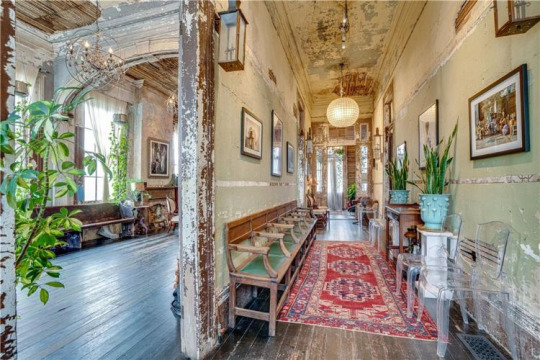

As soon as I saw this entrance hall, I fell in love. I love this look.
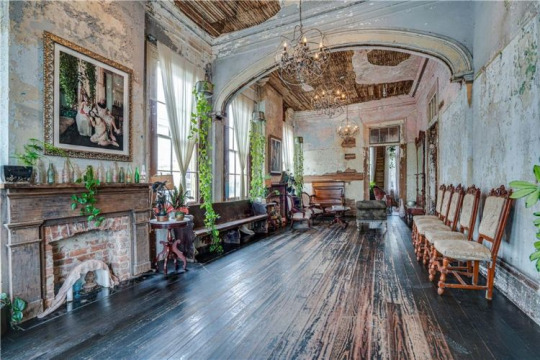
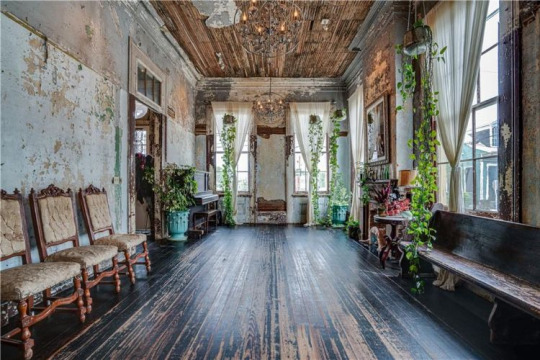
Crazy about these 2 rooms. I wonder if the plants convey b/c they're perfection. This is incredible, it's all original. I can't believe they didn't make it brand new.

They fixed up the pool room, but they left the molding and floor untouched. Maybe this room was in such bad shape they had to fix it.

The kitchen is fabulous. It's not renovated whatsoever. Look at the original sink and vintage stove. There's also a bed in here.
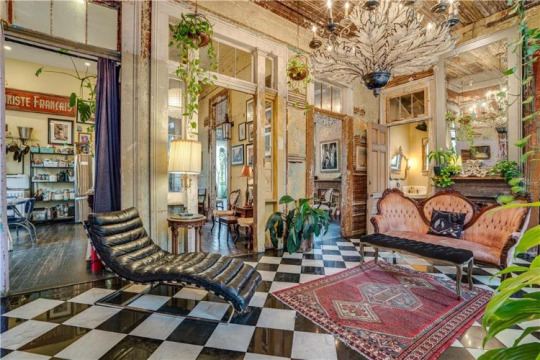
Oh, this room is glorious. It's like a conservatory. Love the flooring, too.

Wow, look at the guest powder room under the stairs. I don't really like that rusty sink, though. It's cute, but I would have to try to clean it up more.

The home has a courtyard and another wing.



This is lovely. Original shiplap, beautiful view of the garden, and I love the fixtures in the bathroom, plus the floor.

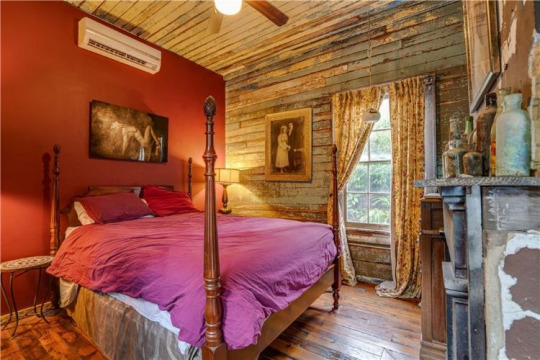
This is so nice. The bedroom opens to the courtyard and I love the fireplace.
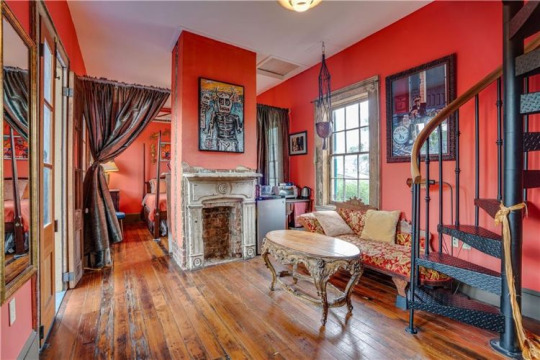
Isn't this stunning? The main bd has a sitting room, a little mini kitchenette, a double fireplace, and spiral stairs.

The bathroom is small, but it's cute.

Wow, here's a spacious room with an en-suite. Look at the rusty tin ceiling.

What happened here? Who put up a new bath with vintage fixtures?

This must be an attic room.
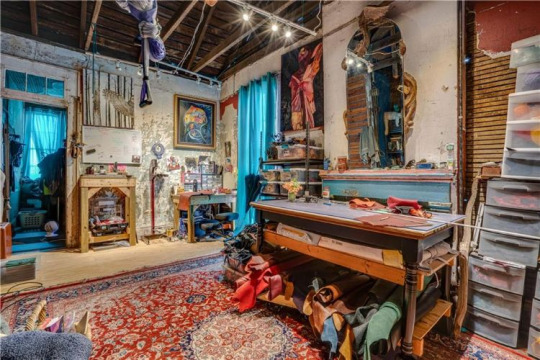
Wow, cool workroom.


The courtyard is so nice- pool, hot tub, sitting area, and look at the lovely balcony.

They put a container in the yard, painted it purple, and made it a fabulous guest house.



Or, it could be someone's bedroom/bath. This is so cool. And, look at the vintage sink, plus how can you not love a Medusa shower curtain?
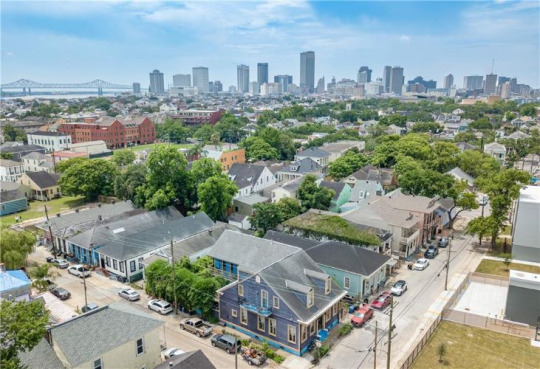
Wow, I didn't realize this home was so large, looking at it from the front.
175 notes
·
View notes